The Green Initiative Fund plans to be on spring 2024 ASUCD election ballot
The program has not received funding for three years, and if not reinstated through this election, will be unable to continue funding projects in the future
BY RIVERS STOUT campus@theaggie.org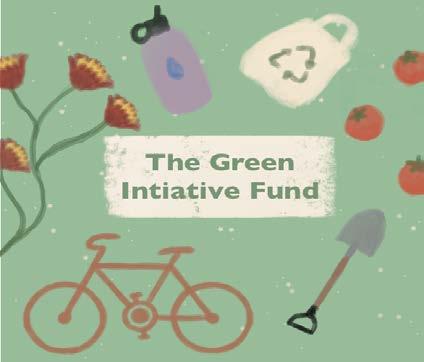
aid. “Normally, a fee has something in place for an increase, or to match inflation,” Suoja said. “But the original fee never increased. The fee ended
in 2021 because of the bill’s lifespan.” Since then, TGIF hasn’t been able to award as much grant money because it is unable to collect student fees. This lowers the total amount of grants awarded to projects.
“Once we stopped collecting fees, a little over an estimated $200,000 remained,” Suoja said. “Over the past two years, we’ve been operating off of reserve funds. There’s been significantly less funding since then — less than
$60,000 [per quarter].” Alina Issakhanian, a third-year political science major and student assistant for TGIF, said that the organization is no longer receiving grant money and is now preparing to
shut down. “We’re trying to close out right now,” Issakhanian said. “We’re trying to see how we can best help [projects] close out before this year ends because after this year, we’re uncertain if TGIF will still be a thing on campus.”
However, student organizers with TGIF are trying for the fourth time to get the fund renewed this spring 2024 election cycle.
“We want to be more of a permanent program, so we’re trying to work with ASUCD to see if that’s a possibility,” Issakhanian said. “We’ve been on the ballot every year since 2021; it’s just that we’re not meeting the voting quota.’’
81.92% of students voted in favor of the program in the spring 2023 election cycle, according to the ASUCD elections website. However, because the voter turnout was only 15.96%, and 20% is required for any student fee referendum to go through, TGIF was still unable to pass.
Both Suoja and Issakhanian emphasized that in this last election cycle, TGIF’s renewal will almost certainly pass if the bare minimum number of students vote.
They are looking to work with ASUCD to increase student engagement in the upcoming spring 2024 election cycle.
With city-wide power outages after an atmospheric river, what can Davis community members do to prepare for the next storm?
Local
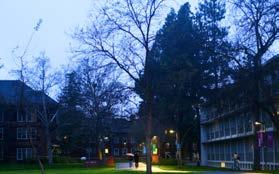 BY KATELIN PANG city@theaggie.org
BY KATELIN PANG city@theaggie.org
share their experience with the storm and recent outages On
dry place to study, with everything seemingly normal until closing time.
“When I was putting away the table[s] and chairs, I was questioning, ‘Will I get blown over?’” Barrett said, referring to the intense wind conditions. “But I didn’t.”
Power outages are not a regular occurrence for downtown businesses, including Mishka’s Café.
“I’ve only experienced two power outages working here, and one of them was the first week I worked here, and the second was last week’s storm,” Barrett said.
The city of Davis posted updates about the storm on Feb. 4, including potential flooding areas and how to prepare for a power outage, as well as offering 10 sandbags per household for pickup at Arroyo and Walnut Park to combat any flooding.
“Expect increased widespread wind gusts. 40-55 mph,” the city of Davis said in a post on X on Feb. 2. “Localized street flooding in some
ASUCD passes bill in favor of divestment from corporations ‘complicit in violations of Palestinian rights’
The $20 million ASUCD budget can no longer be spent on companies on the Boycott, Divestment and Sanctions list
BY RIVERS STOUT campus@theaggie.orgOn Feb. 16, the ASUCD Senate passed Senate Bill (SB) #52, which implements an ASUCD boycott of and divestment from “corporations complicit in human rights violations against Palestinians,” according to the bill’s language. This boycott is in accordance with the Boycott, Divestment and Sanctions (BDS) movement, a nonviolent global campaign promoting boycotts against Israel and organizations that they have deemed “complicit” in Israel’s actions over the past few months, including Intel, Disney, Starbucks and many more.
Prior to the Senate meeting where the bill was considered, UC Davis Students for Justice in Palestine (SJP) encouraged students to attend and speak during public comment in support of the bill through an Instagram post, which had more than 1,400 likes at the time of publication.
At 6:30 p.m., the time of the bill’s scheduled consideration, hundreds of students gathered in the Memorial Union Coffee House (CoHo) to share their opinions on the bill.
“We have been given the opportunity to take direct action by passing this bill, and we need to take it,” one speaker said. “We are sick and tired of coming out here time and time again and seeing no material change. I am sick and tired of having lived the entirety of my life screaming the same chants and mourning the same losses.”
The speaker elaborated, saying that by passing the Senate bill, which stops any ASUCD funds from being spent on items from companies listed on the BDS list, they believed UC Davis students would be “helping to stop the bombing of over 28,000 [Palestinian people] and the complete destruction of Gaza.”
Another speaker provided their stance on the matter, specifically arguing against concerns that the bill could contribute to antisemitism on campus. “BDS is not hate,” the speaker said. “It is a message for liberation and standing against settler-colonialism. BDS is not an attack on Jews, but an attack on settler colonialism and genocide. We, as students, have the power to be on the right side of history, so it is imperative that we support the divestment of Israel and stop supporting the settler-colonial and the apartheid, oppressive state.”
Some students, albeit a smaller group, attended the meeting in opposition to the bill.
“There is not a single bone in my body that asked for this war,” President of Aggies for Israel Carly Klinger said. “There is no part of me that believes that this is how any conflict should be solved. It is without a doubt that innocent lives of Palestinians are being lost. However, this does not mean we need a warzone on campus. By integrating BDS into the bylaws, that is exactly what you will be encouraging.”
Speakers opposed to the bill also mentioned the monetary kickback of its implications.
“Spending a large portion of your ASUCD budgeting on getting rid of printers, computers and software and replacing [them] will cost us our tuition money,” one speaker said. “A boycott of Intel would mean replacing all of the computers across all of the university.”
Others noted that ASUCD does not control all of the computers across the university and only controls those under the ASUCD domain.
“This bill is not seeking to replace any equipment that ASCUD already has,” Senator Yara Kaadan said.
unincorporated county roads and power outages may occur. Please stay safe and don’t drive unless you have to.”
The city also gave a non-emergency phone number (530-747-5400) in the event that issues arose after hours. This was the case for Mishka’s Café.
“The power went out after we closed, so it didn’t affect our customer service, but it took us a little bit longer to put things away and close down the shop,” Barrett said. Other businesses like The Avid Reader also had difficulties with power outages after hours. Eliot George, an employee at the local book store, shared how most of the issues happened the next morning.
“On Feb. 4 we closed three minutes before the power outage,” George said. “So thankfully there weren’t any issues on Sunday. On Monday, however, the computers were reset which required a lot of IT to get everything back up and running.”
The city has also addressed issues with the current storms. Adrienne Heinig, assistant director of Public Works Utilities and Operations, discussed actions the city takes every year. “The city plans for rainy weather and storms every year by proactively cleaning and clearing our city’s drainage inlets,” Heinig said. “Staff check in regularly on spots where they know localized flooding can occur, as well as monitor city stormwater stations in real time. Staff keep an eye on the weather forecast and work with the operational teams to gauge how systems are running and if any additional assistance is needed.” These precautions ensure that streets stay maintained, and residents can prepare for possible storm debris. Heinig also said that there is staff available 24/7 for emergency issues.
STORMS on 8
2024

CITY NEWS DESK city@theaggie.org
Senate California has an upcoming historic Senate election with four major candidates in the running — some of whom have spoken at UC Davis.
SEE ONLINE
Scan to read the rest of the voter guide online

City of Davis Environmental Recognition Award nominations open through March 20
The annual recognition of community contributors to Davis’ environmental quality is now accepting nominations
BY MADELEINE YOUNG city@theaggie.orgThe city of Davis is now accepting nominations for the 2024 Environmental Recognition Awards. These awards are available to individuals, groups, businesses, nonprofit organizations, agencies and schools who have contributed to Davis’ environmental quality of life.
For 30 years Davis has been recognizing community contributions to Davis in the form of these awards, according to Davis Sustainability Program Manager Kerry Loux.
“The Davis Natural Resources Commission began recognizing community contributions to Davis’ environmental quality of life thirty years ago in 1995 as part of promoting awareness of environmental issues and the value of community engagement,” Loux said. “Additionally, a special category, the Environmental Legacy Award, was started in 2017, in recognition of Davis’ centennial year. These legacy awards may be presented
for sustainability efforts that have made a difference as part of Davis’ history.” Previous awardees have included Bike Davis, Peregrine School and Davis Community Meals and Housing in the non-profit sector, Dos Coyotes Cafe has won in the business category and many individuals have been given awards.
Loux explained the process of nominations and giving the awards.
“Nominations for the 30th Annual Environmental Recognition Awards in three categories, nonprofit, individual/group and business, are submitted to the staff liaison to the Natural Resources Commission,” Loux said. “In addition to these awards, the Environmental Legacy Award is selected by the commission to recognize events and programs that have made a significant environmental quality of life difference in Davis over time.”

City of Davis and Team Davis hold Social Security parent education forum
These regular meetings provide parents of children with disabilities information about resources and provide space for discussion
BY EMMA CONDIT city@theaggie.orgThe city of Davis’ adaptive recreation program provides programming for teens and adults with intellectual and developmental disabilities. This program has partnered with Team Davis — a local nonprofit that enhances the lives of adults with developmental, cognitive and physical disabilities — to offer educational forums every other month.
Jillian LeDuc, a program coordinator with the Department of Parks and Community Services specializing in adaptive recreation, described the goal of these educational forums.
“The intention is to provide a resource and break it down for families,” LeDuc said. “Really, the main goal is to get our parents and our families in the same room to talk amongst each other.”
In the past, forum topics have included post-high school resources, housing discussions, post-college and transitional age resources and speakers from the Alta California Resource Center, which provides services and funding to individuals with intellectual and developmental disabilities.
LeDuc explained that in Davis, the disability community is very small and close-knit. Davis’s adaptive recreation program and Team Davis often serve similar populations, and parents who attend these forums often know each other.
The most recent of these forums, held on Feb. 6, focused on Supplemental Security Income (SSI), a form of social security that offers payments to individuals with disabilities. This particular resource, like Social Security Disability Insurance (SSDI) or “disability” social security, is primarily intended for food and shelter. As the forum revealed, SSI is extremely complicated.
SSI expert Pamela Haney led the forum. Haney is a job developer at
Progressive Employment Concepts, a group funded by the Alta California Regional Center that aims to secure employment for individuals with disabilities. In addition to explaining the specific aspects of SSI, she joked about some of the frustrating and ridiculous aspects of the program.
“Social security is fun; it makes a ton of sense,” Haney said. “Social security was designed in the 1930s, and it was assumed that we would work for many years and then get injured and we could take care of our injured wage earners. They never thought ‘Well, what about those who can’t really work to begin with?’”
One of the numerous complications brought up was the difference between diagnosis and functional limitation. For instance, when applying for SSI, a person has to show that they have a low enough income to qualify. Additionally, not only must they prove they have a disability, but they must also prove that it inhibits their ability to generate enough income, which is a tricky process. Haney explained that once a person ages out of the education system, proving the limitations of a disability is challenging.
Haney discussed seizures as an example of this challenge.
“You’d have to prove that seizures inhibit your child’s ability to work,” Haney said. “Without this, [social security] would say ‘Well, why can’t your child just work in between seizures?’ It sounds absurd to us fools with like, empathy.”
An anonymous attendee told the story of the first time she applied for SSI to support her son and did not get it.
“This was about five years ago,” the source said. “We were being very proactive and applied when my son was very young. We missed the amount by 22 dollars. I made 22 too many dollars a month to qualify.”
EDUCATIONFORUM on 8
UC Davis hosts annual Biodiversity Museum Day
The free event encouraged exploration across multiple exhibits that showcased different forms of biodiversity
BY AALIYAH ESPAÑOL-RIVAS campus@theaggie.orgOn Feb. 10, UC Davis hosted its annual Biodiversity Museum Day which consisted of multiple collections of biodiversity exhibits. Open to students and the public, the free event allowed attendees to choose between 10 different exhibits spread throughout campus. Exhibits featured topics such as entomology, botany and plant diversity.
In the Bohart Museum of Entomology exhibit, attendees were greeted with rows of booths featuring various insects and animals. Student interns were also there to provide insightful information for anyone who stopped by. In some booths, participants were allowed to hold and feel various insects, allowing for a hands-on learning experience. Student Intern Guenever Hall, a second-year wildlife, fish and conservation biology major, enjoyed seeing all of the excitement visitors had for the animals and insects on display. “I like seeing how interested
everyone is, because it’s not often people see all these kinds of animals just out and have the opportunity to touch them,” Hall said. Hall’s booth was dedicated to the Lunar New Year and displayed species that exhibited different aspects of a dragon: the Chinese zodiac animal for 2024. To achieve this, the booth displayed pictures and representations of carp, catfish, eagle talons, deer antlers and a rattlesnake.
As for attendees, Alejandra Mercado, a third-year linguistics major, enjoyed how knowledgeable all of the interns were and how they provided a fun experience at every exhibit.
“The student interns seem really interested in the topics they know,” Mercado said. “They just love to share their knowledge, and I love to learn [...] about things I don’t know about.”
In addition, Mercado also enjoyed the free horse-drawn carriage rides the event offered. The rides took visitors between the entomology exhibit in the Academic Surge and the plant diversity
Selection criteria includes the nominee’s actions/achievements and if they address a current environmental concern, if the nominee has a record of achievements or actions that benefit the environment and if the nominee has impacted others in the Davis Community through outreach, engagement or education efforts.
Based on these criteria, award winners are reviewed by the City’s Natural Resources Commission which recommends awardees to the city council. Those selected will be announced and honored in a ceremonial presentation on Tuesday, April 23.
“Recognizing community members for special contributions is an important aspect of acknowledging the value of community engagement,” Loux said. “Awards have included youth activists,
community-based organizations and businesses, among others, who have inspired participation and awareness of environmental stewardship.”
The city hopes that these awards encourage sustainability in the community to further the goals of the 2020-2024 Climate Action and Adaptation Plan (CAAP) in hopes of a greener environmental future for Davis.
“Environmental stewardship is a core value for Davis community members,” said Davis Mayor Josh Chapman. “Through the City’s Environmental Recognition Awards, now in their 30th year, we want to recognize organizations and individuals that contribute to sustainability in Davis. These awards honor those who have made strides to envision and implement sustainability actions in the community and to support the 20202040 Climate Action and Adaptation Plan (CAAP).”
Davis parcel tax banners elicit legal action from conservative law group ahead of Measure N campaign
The Davis Joint Unified School District received a cease and desist letter from Beth Bourne after hanging banners that thanked the community for parcel taxes
BY HANNAH SCHRADER city@theaggie.orgOn Jan. 29, the Davis Joint Unified School District (DJUSD) was served with a cease and desist letter from Dhillon Law Group on behalf of Yolo County Moms for Liberty Chair Beth Bourne.
The letter was prompted by a series of posters, banners and flyers that were hung at schools in the district. The banners’ statement that parcel taxes enhance the district’s ability to provide high-quality education prompted the letter.
“Parcel Taxes Fund Our Exceptional Programs,” one sign in front of the district office read. Measure N, a proposed policy that would continue existing parcel taxes, is not directly mentioned in any of the banners.
“The District has used public resources to urge voters to adopt Measure N, a parcel tax that would fund District operations,” Attorney Jesse Franklin-Murdock, an associate at Dhillon Law Group, wrote in the letter.
Measure N would mainly fund public educational programs in Davis public schools and will be on the March 5 presidential primary ballot. Measure N hopes to continue the funding that was previously introduced in the expired Measure H.
“We write to demand that the District cease its illegal conduct immediately,” Murdock wrote.
Beth Bourne is a UC Davis alumna and long-term Davis resident. In Oct. 2023, DJUSD filed a temporary restraining order against Bourne for harassing teachers who displayed pride flags in their classrooms. Bourne shared that she supports parcel taxes but has accused DJUSD of funding the campaign.
“I’ve always voted in the past for the school parcel tax,” Bourne said. “The school district is sponsoring it, and the school district passed a resolution to put it on the ballot. But how does the school district campaign for it?

And what resources can a government institution use?” Bourne stated that she first noticed the banners at her child’s high school. “When I saw the signs [and] the banners at my [child’s] high school campus, and then [...] at our neighborhood elementary school, I was concerned,” Bourne said. Bourne’s lawyer, Murdock, outlined the main argument of the cease and desist letter. “Saying that the deciding factor is whether the banners, the signs, the other materials, reference Measure N specifically kind of misses the point,” Murdock said. “[Statutes] don’t want you to urge public support or opposition to a ballot proposition or a candidate. Now, there are plenty of ways to do this without actually mentioning the candidate’s name.”
Murdock stated that the law group recently filed a public records request to DJUSD to confirm whether government resources were used for the campaign. Further, DJUSD has not responded to a public records request made by The Aggie on Feb. 6.
“Given that the signs were all over the district property, it gives rise to a
presumption that surely government resources were used,” Murdock said. “I want to find out exactly which ones and I think there’s a number of ways.”
Kristen Conner, DJUSD’s public information officer, noted the district’s position on the matter in a statement via email.
“We have had many posters and banners around the district for years, thanking voters for their support of these taxes (much like you would see along the highway construction ‘your tax dollars at work),” Conner said. “In fact, many of those posters and banners have been in place since the passage of Measure H in 2016. As you can read in the banners, the statements are informational and factual and do not mention or advocate for the passage of Measure N. We have no plan to remove them.”
Conner ended her statement by answering whether further legal action would be taken.
“The letter from the [San Francisco] law group received a legal response that their allegations were without merit,” Conner said. “We consider this matter closed.”
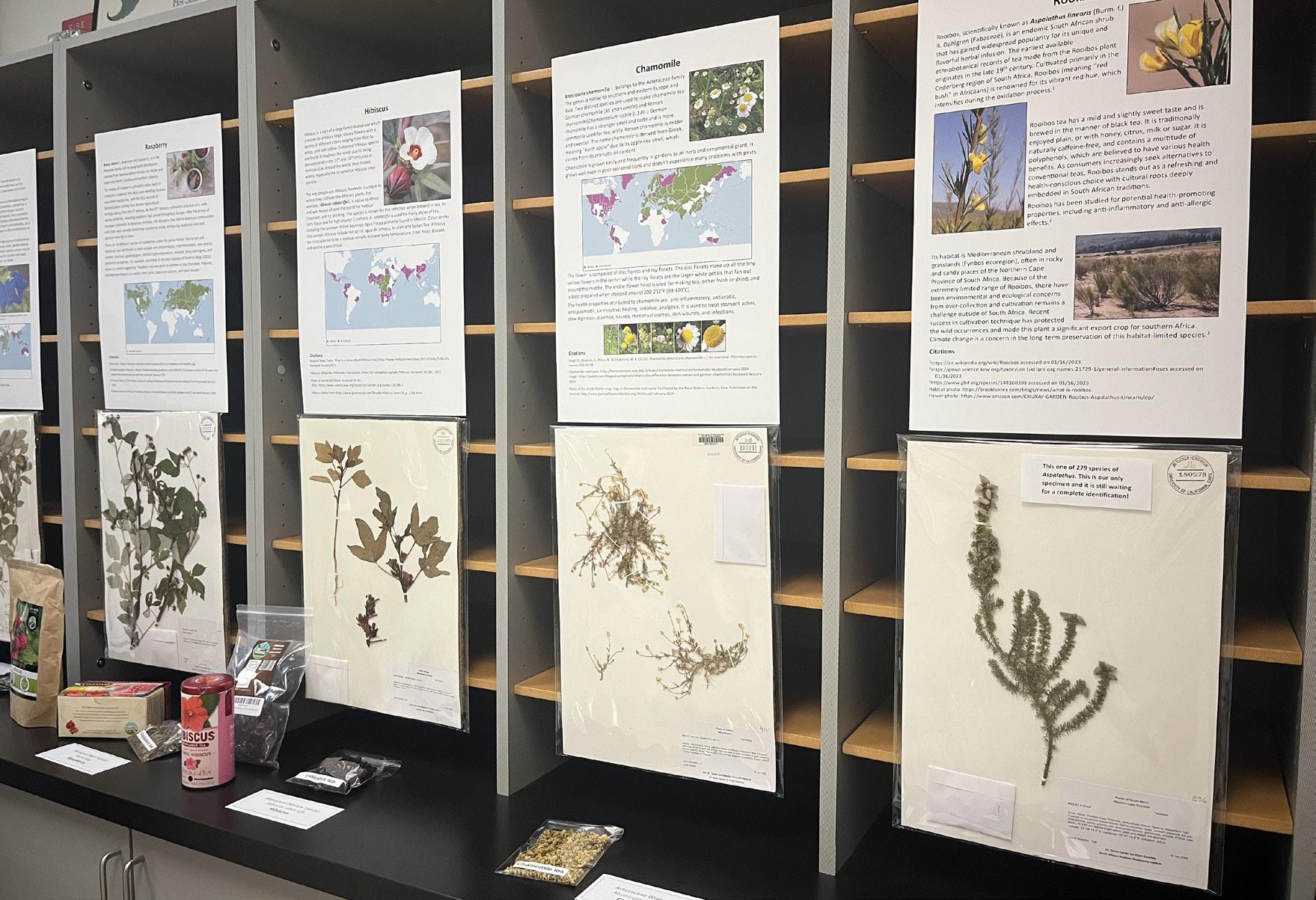
Biodiversity Museum Day saw 10 different exhibits surrounding biodiversity on campus. (Aaliyah Español-Rivas / Aggie) the community. “I love interacting with the public and seeing people that are not normally geeked about insects get super geeked about insects,” Pakpour said. “I love supporting the museum because it’s been so supportive of my career in all of its different stages.”
my god, this was the first time I’ve seen [horse-drawn carriages] on campus,’” Mercado said. “I thought I wouldn’t get the opportunity to [take them], but we could, and the workers were super nice.” In addition to student interns, the event also had various volunteers. Nazzy Pakpour, a UC Davis alumnus who studied entomology and completed a postdoctoral working with mosquitos, explained that she wanted to volunteer to give back to the Bohart Museum and
Looking toward the future, participants expressed their hope to return next year and encouraged students to do the same. Ana Machado Perez, a fourth-year psychology and human development double major,
said that it was important for students to attend
“We
How do UC Davis students and faculty members feel about AI advancements?
Learn more about how AI works, people’s fears around it and how it affects human lives
BY SABRINA FIGUEROA features@ucdavis.eduAdvancements in artificial intelligence (AI) have taken the world by storm, causing some to live in fear and others to embrace how it will affect society’s future.
AI has developed quite further and faster than society could have imagined. It has gotten to a point where AI is being used to generate “deepfakes” that people can no longer always differentiate from reality, which can have repercussions in both politics and personal lives.
This has fueled the fear of many.
Even Geoffrey Hinton — known as “the Godfather of AI” — reportedly told the New York Times that one of his concerns is that the internet could possibly be flooded with false images, text and videos to the point where the average person wouldn’t be able to identify what is true anymore.
So, how did we get to this point?
How did AI develop so quickly in such a short amount of time?
Martin Hilbert, a communication professor and chair of the designated emphasis in computational social science at UC Davis, said there are two reasons for its fast development.
“The amount of data [produced before and during the COVID-19 pandemic] together with the trick of using GPUs, which gave us the computational power, lead to this jump in parameters and made them
more useful,” Hilbert said. GPUs are the latest graphics processing units, which have opened new possibilities in gaming, content creation, machine learning and more.
Artificial intelligence runs on data, and the more data it gets, the better it becomes at predicting and generating human-like work and behavior. When the pandemic hit, and people yearned for human connection, society turned to social media and social-simulation video games online as a mode of communication with other people they couldn’t spend time with in person. This then created a plethora of digital footprints and data that AI now utilizes.
Because data is power, this causes a big dilemma in the AI world. Since human society is filled with bias and discrimination, so is a lot of the data AI utilizes. Left unchecked, AI can help contribute to misinformation or exhibit those same discriminatory biases that humans have.
“If we give [AI] data based on where [society is] right now [and in the past] — living in a very sexist and racist society — that is what [AI] will reproduce and that’s what it does reproduce. That isn’t the machine’s fault, it’s just the data that we have,” Hilbert said. Even so, it’s not difficult to factor out these discriminatory variables so that AI doesn’t use them. All it takes is good prompt engineering skills.
“It’s extremely difficult to eliminate human bias in the brain, it’s
UC Davis students discuss the youth vote in upcoming presidential election Students say voting is an important exercise of your democratic rights
BY ZOEY MORTAZAVI features@ucdavis.eduThe upcoming presidential election this November is the first that many UC Davis students will be able to vote in. Across the United States, the young voter turnout — the demographic ranging between ages 18 and 29 — has remained low in recent years.
In the last several midterm elections, the young vote has averaged at around 25%, with a 28% turnout in 2018 and a 23% turnout in 2022.
These numbers actually show a significant increase from 2014, when the young voter turnout only averaged 13%.
Despite the fact that there has been a 10% increase in the last decade, the overall youth voter turnout is still far below half of the young population.
UC Davis students are advocating for the younger generation to take to the polls this November; many believe that it could make a world of difference for upcoming elections.
“I completely believe that the young vote is very important,” Maya Leonard, a first-year design and communications double major, said. “We’re voting on issues that will affect us more than older people since we will live through the effects for decades. We should be making decisions and having our input so that we create the world and country we want to live in.”
Fewer young Americans plan to vote in 2024 in comparison to 2020, which was a record-breaking year for the youth voter turnout, according to a poll done at Harvard’s Kennedy Institute of Politics.
“I think it’s so crucial that [young people] go out and vote, especially us as college students,” Harry Gunter, a first-year international relations major, said. “We have an opportunity to educate ourselves about politics and get involved to make change. This is a really complicated time politically, and in times like that, every person’s vote can make a huge difference.”
Various studies have been conducted, including one by the New York Times, into why the youth voter turnout is consistently so low. The study discusses potential ways to increase the youth vote, including reducing systemic barriers for young voters to register and reimagining civics education in the long term. Political education and participation seem to be major factors in whether or not people choose to vote.
Isabel Wade, a second-year design and psychology double major, shared her thoughts on the role that young voters play.
“I think voting is an important part of our American institution because it upholds democracy,” Wade said. “I am particularly excited to vote in this upcoming election — for the first time — to play my part in making a positive change in society.”
Strictly due to the percentages associated with the youth vote, there is a large number of young Americans who choose not to vote. Whether
just a bandwidth capacity problem,” Hilbert said. “However, you can get it out of machines. So you can tell a machine, ‘Consider all the variables you want, but do not consider gender. Make sure that in regards to gender, the outcome is completely neutral,’ for example. The machine will be able to optimize that.”
As machine learning becomes more advanced, society is now seeing that it can help aid human cognition and labor. In some cases, it has already surpassed the abilities of humans — such as standardized testing.
“For the SAT, in reading, writing and math, humans score [in the] 65th [percentile] and [GPT-4] gets up to 90,” Hilbert said. It doesn’t stop at SAT either. GPT-4, a multimodal large language model created by OpenAI, has also passed professional exams, such as the Bar Exam that law graduates take to become attorneys. GPT-4 was able to pass the multiple-choice portion as well as both of the written portions of the bar exam, scoring in the 90th percentile — exceeding the average human score.
Hilbert also suggested that emotional empathy in artificial intelligence may already be better than the human capability of empathy.
“If we use a machine to consult a primary care physician, for example, people evaluate the machine to be much more empathetic, [especially in] emotional listening. It’s not a robot, it’s something very intimate,” Hilbert
said. “In terms of knowledge and emotional intelligence, [AI] outperforms us already, and it can always become better.”
However alarming this may sound, AI is still not perfect. In fact, OpenAI announced that their large language model is still less capable than humans in other scenarios, though it outperformed humans on the SAT and other professional exams. Its biggest problem is that it tends to make things up and insists it’s right when it’s not.
 KELLY GUAN / AGGIE
KELLY GUAN / AGGIE
it’s because of discontent with the American government system, a lack of political education or a different reason, the youth vote has a long way to go before it surpasses other age demographics.
Despite this, there is a large amount of research being done about how political activism has changed in the face of a rapidly growing technologybased world, with Generation Z being at the forefront of much of this activity. This age demographic tends to be politically active and passionate about humanitarian issues; however, this is not always reflected in the ballot numbers.
“Young voters are passionate about the issues that impact them. That’s why they’re at the forefront of our community-based activism,” Nile Blass wrote in an article for the League of Women Voters.
“Research suggests that Gen Z is the most likely generation to boycott a product, company, country or state because of an ethical stance; only one in five Gen Z-ers would work for a company that doesn’t share their values, and 70% of Gen Z-ers are involved in at least one social or political cause.”
UC Davis has many resources for students looking to vote in upcoming elections. Aggie Votes offers election information, voter resources and voter registration information. Students have access to a great deal of information and material to get informed leading up to the presidential election in November of this year. There is also information about where to find ballot boxes on or near campus, as well as advice about where to register as a student living in their college town.
“The notion that young people’s perspectives aren’t valuable in politics is absurd. We are the generation that will feel the impacts of today’s policy for the longest,” Erin Wade wrote in an article for Forbes. “That’s why it’s so important for young people to take advantage of every opportunity we have to influence policy and why it’s important that colleges and universities make intentional plans to increase nonpartisan democratic engagement and student voting.”
No matter the reason for the low percentage of young voters in America, UC Davis students are encouraging their peers to cast their ballots in this upcoming election and exercise their democratic rights. Seeing as UC Davis prioritizes giving its students voter resources, students should have no trouble finding where and when to submit their votes this November.
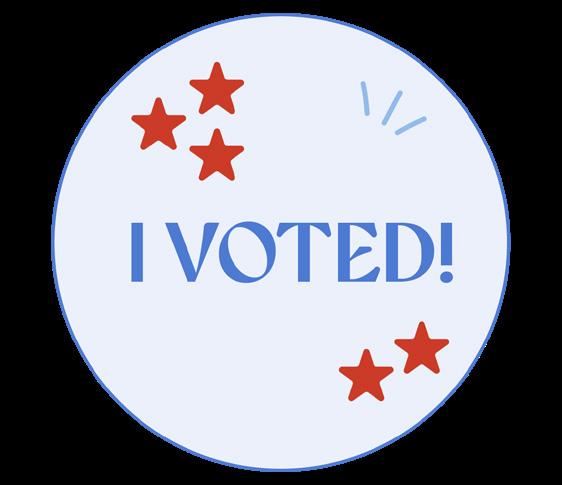
Despite its seemingly helpful advancements, some continue to see AI’s power in knowledge and other skills as a threat to education and the workforce.
At almost every university, including UC Davis, professors note in their syllabi that the use of AI when completing assignments is prohibited unless otherwise instructed. To regulate its utilization, professors usually enforce AI detection programs to hold students accountable. Yet, none of those programs can reliably detect AI-generated text, and the most popular program that universities use, Turnitin, even admitted that it detects a lot of false positives.
Lizette Torres-Delgado, a secondyear political science and public service major, spoke about her experience with AI at UC Davis. “I haven’t used AI because many of the professors that I’ve had are really against it, and I’d also rather do research myself to know more about a
topic I need to write about.”
In the midst of this, there are some professors who make it mandatory for students to explore AI and become familiar with its functions.
“I make it mandatory in my classes, and that doesn’t make me very popular with my colleagues,” Hilbert said. “I [enforce the use of AI because] I just think it’s unfair if 10% of students use it and the other 90% don’t. It’s also why I ask more of my students now, [they can now] do more thanks to the [AI] assistantance students have.”
Additionally, some students use ChatGPT and other large language models in a way that wouldn’t be classified as “cheating,” but simply as a complementary aid.
“I have used ChatGPT and also Notion’s built-in AI and I’ve really enjoyed it since it helps me come up with new ideas or helps me understand things more clearly whenever I am confused or lost [on a topic]. AI is a great tool to help students brainstorm in my opinion,” Alejandra Velasco, a second-year computer science major, said. In her experience, AI benefits educational spaces rather than threatens them.
How getting enough sleep can influence a student’s performance inside, outside the classroom
UC Davis students share their sleep routines and how they affect their daily activities
BY JULIANA MARQUEZ ARAUJO features@ucdavis.eduMany college students are familiar with the concept of stress-induced sleepless nights. Getting good sleep is important for anyone, but for fulltime students who have to balance sleep with assignments, classes, hobbies and for many, work, 24 hours can pass them by before they realize it.
However, it is important to prioritize a sum of seven to nine hours of sleep each night in order to maintain a healthy lifestyle.
Audrey Vargas, a third-year psychology and biology double major, understands the importance of rest in her schedule, but also acknowledges how difficult it can be to balance that with other key elements.
“I love my sleep; I try to get eight hours a night, [though] it can be hard to manage,” Vargas said. “Especially my freshman year, it was hard when I had a lot of assignments to prioritize, but I would say more recently I’ve had a better head on my shoulders, in the sense of not compromising [my sleep] as much.”
Vargas shared her perspective on time management and how this mentality has contributed to her improvement in prioritizing sleep.

“I think it was more so the realization that school is just a part of your life. If you’re not taking care of yourself, you’re not going to do well in school,” Vargas said. Inversely, Aileen Perez, a fourthyear genetic and genomics major, tends to lose sleep when she has an important date ahead of her, such as a midterm or final. “I actually do worse,” Perez said. “I do bedtime procrastination where I just ‘doom-scroll’ for a whole hour before I go ‘Oh, I actually have to go to sleep.’” In the midst of a taxing period,
students may find comfort in social media, as it allows them to take a break from their demanding activities. However, by over-exercising this activity, you can sometimes minimize the amount of rest you gain throughout the night.
In an academic environment, some students who leave studying to the last minute feel an intense amount of pressure and panic, all at once. This pressure can lead to “allnighters,” where students stay up all night in order to prepare for an exam or complete an essay.
NOSLEEP on 12
Dead but not gone: The importance of taxidermy in the field of animal studies
The Museum of Wildlife and Fish Biology collections manager and passionate wildlife, fish and conservation biology majors speak on the subject
BY FAITH DEMEULENAERE features@ucdavis.eduThe Museum of Wildlife and Fish Biology at UC Davis is a silent force working tirelessly to preserve the delicate balance of our planet’s biodiversity. It stands as a beacon of commitment, dedicated to the protection and understanding of our world’s many species.
According to their website, their mission is to “support teaching and conservation in vertebrate natural history and biology through active research, hands-on education, and by maintaining a museum dedicated to documenting and understanding species taxonomy, life histories and biogeography.”
Madison Morgan, a fourth-year wildlife, fish and conservation biology major, is an intern for field work that contributes to the museum.
“Conservation in the field is so rewarding because you can see the benefit to animals in real time,” Morgan said. Morgan also noted the importance

The Percy Jackson TV show is nothing I wanted it to be and more
Rick Riordan personally crushed my dreams
BY MOLLY THOMPSON mmtthompson@ucdavis.eduI, like the vast majority of my generation, spent my upper elementary and middle school years nose-deep in the pages of Rick Riordan’s “Percy Jackson and the Olympians” series. And then the subsequent “Heroes of Olympus” books, and then “Magnus Chase and the Gods of Asgard,” and so on and so forth. A story centered around a charismatic, relatable, funny adolescent protagonist with a charming
inner monologue and a misfit foundfamily who manages to cleverly stumble through fantastic adventures — what’s not to love? If you’re under the age of 25 and you’ve never thought about who your godly parent would be, you’re either lying or you’re at least a little bit of a loser. So when I got wind of a Disney TV show adaptation of the beloved book series that would be spearheaded by none other than the author Riordan himself, I was elated. The chance to see my favorite characters traverse the world of Greek mythology and trip acid — I
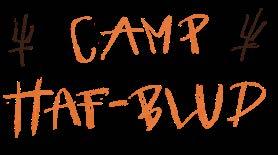 KELLY GUAN / AGGIE
KELLY GUAN / AGGIE
mean lotus flower cookies — in high definition? Sign me up.
Alas, I was disappointed. The first few episodes really led me on — they were more or less book-accurate, and they made my inner middle-schoolfangirl very happy. Walker Scobell, who plays the titular character himself, did a great job embodying Percy’s quintessential irreverence and sarcastic, juvenile antics, and much of the rest of the cast were similarly excellent in their performances. The one character that I do take issue with, however, is Annabeth Chase. Now, I have absolutely nothing against Leah Jeffries, who plays the character. In fact, I think she’s an incredibly talented actress. But the way her character was written in the show just doesn’t live up to book-Annabeth. Annabeth Chase is a complex and nuanced individual, but she came into that complexity and nuance over the course of a ten-book-long saga. I think one of the first mistakes the show made was trying to divulge into her depth too quickly, which both incentivized them to make plot changes and shifted the way that we came to know her fundamentally. Admittedly, I may be biased.
Annabeth has been my comfort character since my introduction to the series. My driver’s license says my eyes are grey and I don’t want to talk about it (In the right light they are, okay?), so I have very high expectations for how she’s portrayed. I’m actually completely fine with the visual differences between the actors and the physical literary descriptions. In a way, I appreciate it because it allows me to keep a level of separation between the book characters and the show characters, which prevents the show from altering my perception of the books. Book-Annabeth is fiery, witty, sharp and stubborn. She’s defensive because she carries a lot of emotional baggage, but we don’t know that initially because we only see her through the eyes of a pre-teen Percy Jackson, who hasn’t yet learned what makes her tick. Show-Annabeth is clever, determined and clearly strategic in a very true-to-novel way, but she lacks the spark and fervor that her on-paper counterpart embodies. Book-Annabeth, when she’s young, is so driven by a deep sense of having something to prove, and I just don’t get that on the screen.
Regarding the plot, to me, it felt like the writers kept the bare-bones skeleton
The ASUCD Senate’s biggest mistake
Our student government’s lack of vision cost them a failed impeachment attempt
BY MALCOLM LANGE mslange@ucdavis.eduPresident (IVP) within the first couple weeks. President Ojeda and IVP Raghunathan were the subject of scrutiny by the ASUCD Senate last quarter who voted to impeach each one in a unanimous vote. From their official statement that was released on the ASUCD Instagram account, some accounts of impeachment are slightly vague. Their conditions, however, seemed reasonable enough to want replacements for the executive members who were not, according to them, performing their designated tasks efficiently. Bam, wham, Bob’s your uncle, right? It, unfortunately, was not that simple. The Davis College Democrats (DCD) made a post that same week calling out the Senate for their “undemocratic and unconstitutional impeachment.” That is a huge accusation to throw around — but only if anyone actually cared.
The fact of the matter is not many students actually cared or even knew about what was happening. Obviously, outside organizations getting involved and commenting on the situation proves that students do care, even if it’s so they can support their friend who is
president (yay friendship!). But if you are not in the vast minority who follow the DCD or ASUCD Instagrams, this probably went completely under your radar. This is because the ASUCD Senate didn’t see the bigger picture. The Senate did not advertise what was going on well enough, and it was one of the reasons the DCD called them out — a lack of transparency. Assuming that the Senate was not attempting a malicious power grab, they should have broadcasted this everywhere. It should have turned into a bigger deal, because what gets people interested in a boring school function other than drama?
Most of the students I interacted with, who do not read The California Aggie, did not know that our President and IVP were being impeached, let alone that we really had a student government. The ones who did know about the ASUCD had no clue what they do, or what the impeachment was about. Students who are not directly correlated to the ASUCD rarely know what they really do, and that is an issue. No one, outside those on the payroll of the ASUCD, cares about the inner workings of ASUCD. Sure, that is a bit of a generalization, but not by much. How, then, are you supposed to get roughly 31,500 undergraduate students to care about something that many of them haven’t even heard of? A disaster.
It’s time to say goodbye to unpaid internships
While they may be legal, they are never really ethicalBY CLAIRE SCHAD
cfshad@ucdavis.edu
Internships, though not mandatory for graduation at UC Davis, offer valuable opportunities for students to explore career options and develop professional skills essential for job applications. Given this, society puts immense pressure on college students to get an internship before graduating. However, almost half of all internships are unpaid, making them unattainable for many students.
Last winter, I was anxiously applying for internships in Washington, D.C., before my impending departure to the UC Davis Washington Program. I was nervous and excited about the opportunity to study and work in the nation’s capital for the spring quarter. However, my foremost concern was finding an internship. Like many of my peers, I spent hours searching LinkedIn, Indeed and other job bulletins, noticing that about half of all postings were for unpaid positions. Despite saving up before I left, the prospect of an unpaid internship in the fifth most expensive U.S. city made me nervous. However, I was not in a position to be picky, so I applied for various paid and unpaid internships. Luckily, after an intense search, I secured an internship that provided a monthly stipend. Even though I was paid less than half of D.C.’s minimum wage, I was still grateful for the financial support that the stipend provided; however, it came nowhere close to covering my living expenses.
While I was lucky enough to be in a position where the internship worked for me, many students don’t have that privilege. For some, the idea of forgoing regular wages to participate in an internship is impossible. Additionally, Deferred Action for Childhood Arrivals (DACA) recipients and international students are often barred completely from receiving compensation for certain internships, including those in Congress.
Unpaid internships perpetuate class divisions and inequities, allowing wealthier students to complete unpaid work and boost their resumes while those who can’t afford it miss out on opportunities. Despite the evident barrier that unpaid or underpaid internships create, many companies and organizations fail to pay their interns adequately.
So, if internships are crucial to our professional development, why are so many companies still refusing to pay their interns? Well, they do so because they can. According to the Fair Labor Standards Act, unpaid internships (or any internship that pays less than minimum wage) are legal as long as the intern is the “primary beneficiary” of the experience. This means that the intern’s work must not be substituted for that of an employee, and the education that an intern receives while working can act as compensation. Despite these regulations, unpaid internships have been normalized, and nobody is checking to see if a person should be financially categorized as an intern or an employee.
Even more frustrating, in most situations, interns are critical to the operation of certain offices and companies. During each of my internship experiences, supervisors explicitly stated that the office or organization would not be able to function without interns, which is true from my experience. This dependence on interns seems as though it would violate the requirements of the Fair Labor Standard Act, yet unpaid internships are still widespread. Unfortunately, it is unlikely that there will be a nationwide overhaul on unpaid internships anytime soon. However, there are still ways the system can be improved. The Subsidizing Unpaid Interns Program was a promising step taken by the University of California D.C. program (UCDC) last fall.
The squeaky wheel gets the grease, but if the problem gets fixed too quickly and too quietly no one knows it was broken in the first place. That should not be the goal of the Senate, because if they truly believed that President Ojeda was a bad fit for president, they should want more people qualified or interested in the ASUCD to help vote for better candidates. The best way to get students to care is when it starts to affect them. If the Senate wanted more student participation and to get rid of President Ojeda, they failed at both objectives. DCD was right, their impeachment was rushed.
They impeached Ojeda within his first quarter as president, and didn’t let anyone simmer with the consequences that he brings in the role. The Senate should have let him be, continue to allow him to make mistakes, miss deadlines and drive the ASUCD into a nonfunctioning mess.
Would this go against certain guidelines in the ASUCD Constitution? Potentially, since they must actively strive for an efficient operation of the ASUCD. However, as the Judicial Council does not seem to care a great deal if this is actually met, since they did not remove President Ojeda for failing to accomplish the tasks relevant to his office that would provide the efficient operation of the ASUCD, then that standard clearly is not very important within the
ASUCD. Unlike President Ojeda’s failure to maintain an efficient operation of the ASUCD, the Senate will be aiming for a greater good — a greater involvement within the ASUCD and the community they serve, the students. The best way for students to really see what the ASUCD does is to show what their lives might be like if the ASUCD cannot function correctly. Budgeting issues regarding the CoHo or the Unitrans? Oh no, maybe they go on strike, making everyone’s life way harder. What will people do? Start protesting and blaming people, primarily the president especially if the Senate accuses him of not doing his job properly thus causing the strikes. The students will want Ojeda out in no time, and the Judicial Council will have no choice but to listen.
Students will see how important the ASUCD actually is, and once elections come up again, all that needs to be done is remind them of what happens when someone not up to par is elected. This will create greater engagement and higher voter turnouts, which is fantastic. An added bonus is students will be more inclined to check in with the ASUCD if they actually participated in the voting process since they have metaphorical skin in the game — they will hope the person they voted for is doing well. This is all easy to say as an outsider
of the novel and rearranged all of the guts. Yes, they go to the waterpark and the Lotus Hotel and the waterbed store, but everything that happens at each location is completely different. Riordan has provided explanations behind some of the changes that were made. For example, in the final episode, he notes that “the pearl doesn’t take Percy back to the beach in Santa Monica, but to a more convenient [and] important beach: Montauk. We figured if the pearl always returns to the sea, why not the Atlantic, which is closer to camp? This cuts some details like the airplane ride back, yes, but [in my opinion] this made sense and there were a lot more important things to cover! Like the upcoming battle with Ares.” This makes sense to me. It’s small, it doesn’t change anything major and it adapts well to the on-screen format. What I don’t appreciate is when they change an entire, major plot point without a clear reason. Multiple times throughout the series, the central trio (Percy, Annabeth and Grover) would go into a situation where I, as a devoted fan, knew they were about to encounter a monster.
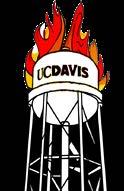
to the ASUCD, and I know that. It is also easy to say since we are looking back at how the events unfolded and that Ojeda was not even impeached, making the whole thing incredibly stupid and a waste of time. It did make for some fun drama, but it could have had more drama for a better purpose. Is this idea of what the Senate should have done less than honest and slightly unconstitutional? Yes. But that’s just politics, and if it generates more participation with the students to the ASUCD, I say it will be worth it. But hey, that’s just a theory.
Disclaimer: The views and opinions expressed by individual columnists belong to the columnists alone and do not necessarily indicate the views and opinions held by The California Aggie.
Lose yourself for a minute
Some
short
stories to help propel yourself down a mental spiral of existentialism
 BY MIAH JORDANE mjcampos@ucdavis.edu
BY MIAH JORDANE mjcampos@ucdavis.edu
It’s not always great to get wrapped up in an episode of overthinking. However, what is great is knowing that others share the same struggles.
Throughout literary history, authors have embraced these notes of insanity and leaned into the dark corners of their minds by vocalizing them on paper –– creating a vessel to release these burdening thoughts and feelings. There are many short stories that showcase this phenomenon, but I’ll just name some of my favorites. These short stories emphasize the adoption of mental darkness: whether it be pressured upon them through external forces (i.e. people, social climate, unforeseen circumstances, etc.) or through the sheer result of who they are/become within the story.
“The Yellow Wallpaper” by Charlotte Perkins Gilman is a literary classic that stands as an inspirational influence, bleeding into many other works of literature. Once you read it, you will begin to see parallels in other works that reflect the ideas and images created by Gilman through “The Yellow Wallpaper.” Beginning as a hopeful story of a young couple moving into a new house, “The Yellow Wallpaper” seems quite innocent –– wholesome even. The couple is seemingly deeply in love as they both put in an effort to help the wife with
her postpartum depression. However, the story increasingly gets more neurotic as the wife begins to analyze and hyperfixate on a particular room in her house –– the room her husband has practically quarantined her inside of in hopes that her forced rest and isolation from the world will “cure” her of her “sickness.” I will not spoil the story for you, but the room’s wallpaper plays a key role in symbolizing the societal issues and mental state of the wife, hence the title. This story is about the sad carelessness that, with time, takes a drastic toll on the wife’s mental state. It’s a story that will stick with you for weeks –– if not the rest of your life. In addition, “The Ones Who Walk Away from Omelas” by Ursula K. Le Guin is a fantasy, science-fiction short story about a dystopian world with a gut-wrenching twist. If you are keen on darker stories discussing social and personal morals, this short story may appeal to you. Again, “The Ones Who Walk Away From Omelas” begins in an unsuspecting way: happy and cheery, introducing the city of Omelas and the thriving population that lives within it; it’s a utopia, even. If you’re an active, engaged reader, it would be easy to have an increasing weariness blossoming behind the description of Omelas –– as it seems almost too perfect. The plot twist is one that I will allow you to uncover, as it’s hard to describe. However, I will say that this
story deals with a moral dilemma one must weigh in order to live within a “utopia” like Omelas. If one decides it is a burden they cannot bear, they may walk away forever. I didn’t know what to expect when reading this story. But, it’s been about a year since I first read it, and it still lingers in my thoughts to this day.
Lastly, but definitely not least is “The Story of an Hour” by Kate Chopin. This one packs a punch with the build-up and tension of the final moments. “The Story of an Hour” could be just a two-page read, but if you want to get the most out of it, I would read it over twice: taking in the content during the first read, then picking it apart the second time. This story focuses on Mrs. Mallard, an older lady who struggles with heart issues and is told about the unexpected death of her husband. It’s a delicate matter and a lot for her to process for her as a newly widowed woman in the nineteenth century. The two pages elaborate upon the complicated web of feelings and realizations the woman experiences as she processes the news of her husband’s passing.
This quick-read takes a strong stance on the burdening pressures of being a wife and woman in the 1800s but can still be applicable to social dynamics and expectations of women in the present day, too. If feminist texts interest you, this one might be an enticing experience.
Farewell graduates, but four months early
Here’s what you need to do to prepare for commencement and make the most of the rest of your time at Davis
Graduation can be a bittersweet time in a student’s life. It marks the end of years of hard work, a time of personal growth and the start of a new chapter. If you’re someone whose last quarter is rapidly approaching, you are finding yourself at the exciting crossroads of the final months of university and the beginning of the rest of your life.
No matter your motivation for making it this far — your family, the dream of a stable career, to fulfill the potential your middle school math teacher said you’d never live up to — it’s something to be proud of. Whether you’re counting down the days until you cross the stage or you feel cheated by how quickly the time went by, you can take solace in the fact that your experiences at Davis — both good and bad — have prepared you for the
challenges and triumphs that await you. As cliché as it sounds, there is so much more to see and do after college, and it’s important to embrace the uncertainty of the future as this period of your life comes to a close.
Before you’re set free into the real world, there are a few responsibilities you’ll want to take care of to ease your transition into becoming a wide-eyed, likely unemployed graduate. And as long as you’re here, you may as well take a look at our Davis bucket list recommendations so you don’t leave with any regrets. Feel free to cut out this list and check off as many as you can. If you’re not a senior, get a headstart!
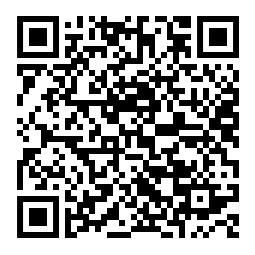
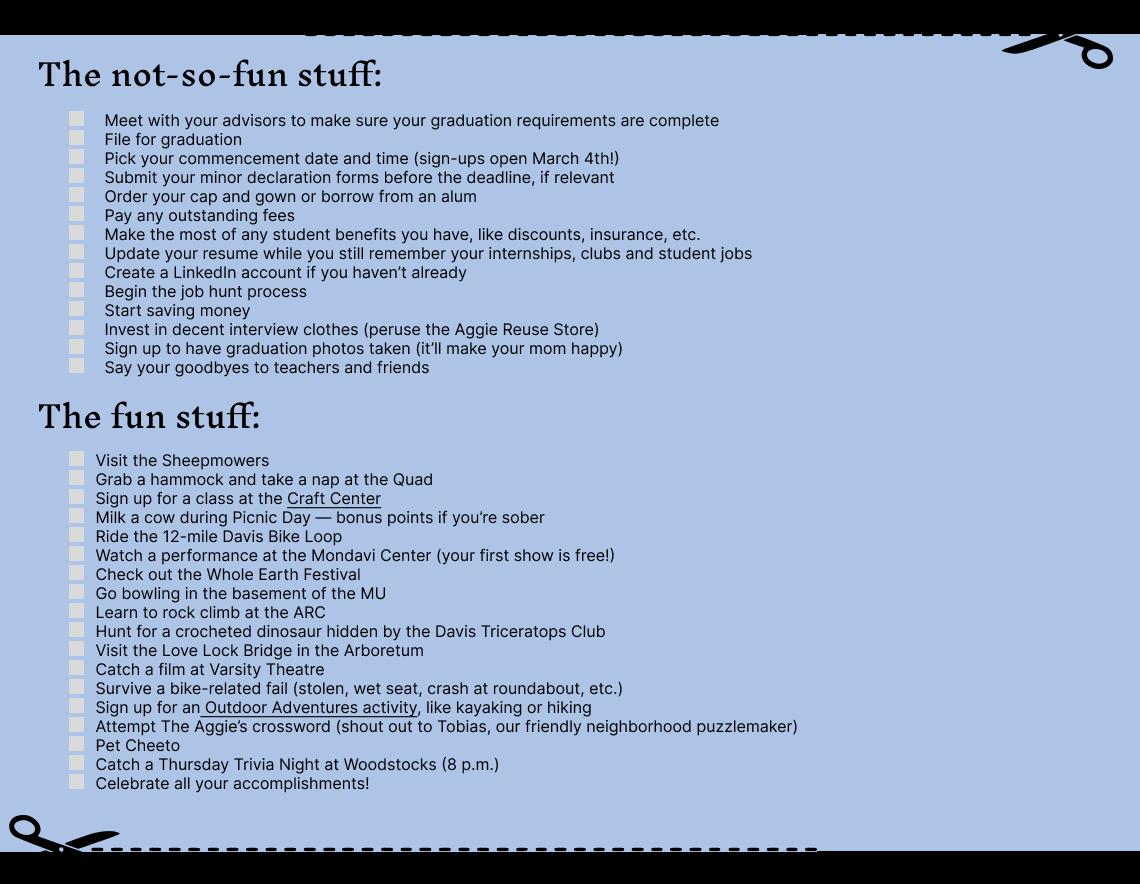

UC Davis should not sign another Pouring Rights Contract with PepsiCo
The No. 1 most sustainable campus in the nation shouldn’t support a massive plastic polluter
BY ASUCD ENVIRONMENTAL POLICY AND PLANNING COMMISSIONeppc@asucd.ucdavis.edu
Despite student and faculty opposition, UC Berkeley signed another 10-year Pouring Rights Contract (PRC) with Pepsi, one of the world’s largest plastic polluters. UC Davis should not make the same mistake. UC Davis’ current PRC with Pepsi ends in summer 2024, and they’re deciding whether to sign another PRC with Pepsi or to leave the contract altogether.
A PRC establishes a beverage monopoly on campus, enabling a single company like Pepsi to control the market, limit competition, influence industry dynamics and aggressively market to students while co-branding with UC logos. ASUCD opposes a Pepsi PRC as stated in Senate Resolutions #6 and #2. Those of us at ASUCD’s Environmental Policy and Planning Commission (EPPC) authored these resolutions, created an online petition and organized a peaceful student-led protest.
Why is the partnership with
Instead, according to Kaadan, the bill would block future deals with these companies. Another speaker in opposition to the bill noted that most affordable kosher food options on campus come from Israel-affiliated companies.
“Sabra, for example, is a company that produces many kosher items, some of which are offered at the CoHo and campus stores,” the speaker continued.
“If this bill were to pass, Sabra, among others, would be banned. By passing BDS, you are taking away on-campus kosher options from Jewish students. That is blatant discrimination on the basis of national origin, culture and religion.”
While this was a popular sentiment among those opposed to the bill, External Affairs Vice President Celene Aridin later rebutted this argument. She said that ASUCD is one of the only student governments that opens its own businesses, such as the several restaurants in the CoHo eating area, and it is therefore possible for these quick service stops to provide more kosher food products on the menus.
PepsiCo bad for UC Davis?
Sustainability :
UC Davis is the most sustainable university in the United States while PepsiCo is the second largest plastic polluter in the world, producing over two million metric tons of plastic packaging annually. An association with PepsiCo contradicts our campus’ environmental standards.
Another PRC with Pepsi would undermine our UC systemwide policy to eliminate single-use plastics by 2024. For the fourth year in a row, the UC system has failed to achieve this, partly due to our current PRC. Pepsi will not provide non-plastic containers for all beverages, forcing UC Davis to buy single-use plastics until 2030. Choice: The proposed PRC would require us to exclusively sell 85% Pepsi products, preventing students and staff from accessing a variety of options, including healthier or more sustainable drink choices.
High prices: Beverage prices are high on campus (other than the Coho, which is not part of the Pepsi contract). The Pepsi PRC sets high
Some UC Davis Law school students refuted the claims of discrimination on a number of grounds and told the Senate that they were more than willing to examine the legality of the bill and subsequent actions. “I stand before you queer, trans and Jewish,” a speaker in favor of the bill said. “I am a strong supporter of the divestment bill and of a free Palestine. The Jewish opposition here does not speak for me and will never speak for me. There are thousands of Jewish people across the country organizing every day with the same beliefs.
Supporting the BDS bill is not antisemitic, it is what is right.”
After public comment had ended, and the table had taken a brief break, senators voiced their thoughts on the bill.
“I believe that SB #52 is in many ways very hastily written to surprise the Senate, half of whom are recently elected, and most of whom have absolutely no knowledge of [the history of] Israel and Palestine,” Senator Gabriel Gaysinsky said. “And why should they?
[There are] a bunch of STEM majors and people who have nothing to do with this. Most people simply do not know.”
Gaysinsky’s words were met with sounds of disapproval from many of the gathered attendees. Aridin called for silence and requested that people
prices and increases beverage prices with annual price escalations, which is especially concerning considering the prevalence of food insecurity among UC Davis students.
Marketing: Our current and UC Berkeley’s new PRC with Pepsi spells out aggressive marketing to students, including Pepsi branding of wellness activities and the campus gym. We are here to receive an education, not be captive audiences to the marketing of high-sugar products that are harmful to our health.
The dwindling revenue is not worth it: The sponsorship money UC Davis receives from the current PRC amounts to less than 0.01% of the university’s total revenue. Given that UC Berkeley’s sponsorship money was cut nearly in half in the new contract, UC Davis can expect even less from the next contract. So we ask the students, faculty, staff and administrators of UC Davis: why would we allow a company with such a bad track record around health and sustainability like Pepsi to degrade our values?
We call on the chancellor, the Chancellor’s Leadership Council and the UP3 Advisory Committee to
remain respectful.
“It is not a question of intelligence,” Gaysinsky said. “Some of us have studied this for years and some are barely getting into it now because [the bill] was introduced [to the Senate table] six days ago. Unless distinct changes to the bill’s language and intent are made, it will continue to be an attempt to strongarm a vote to uplift one community at the expense of another.”
He moved on, speaking on Jewish people who had voiced support in favor of the bill.
“It is very telling that many of those who came to speak ‘as a Jew’ are those that I’ve either rarely seen or never seen active in the Jewish community,” Gaysinsky said, air-quoting the words, “as a Jew.”
Kaadan then responded to Gaysinsky’s words.
“This bill is very clearly targeting the actions of a nation-state and very exclusively stating it is not targeting a group of people,” Kaadan said. “If you have an issue with condemning genocidal violence, it’s not my responsibility or Palestinians’ responsibility to make you feel comfortable in your genocide denial or justification.” Kaadan shared more on this thought.
“I would really hope that everybody on the table agrees with me on this,
not sign another PRC with PepsiCo or any other beverage company. Instead, UC Davis should be able to purchase beverages from multiple producers, including small businesses with sustainable and ethical practices. While UC Berkeley has unfortunately signed another PRC with Pepsi, UC Davis can set a precedent for the other UCs to disengage from PRCs that undermine our values. What can you do? Sign our petition now! Voice your opinion to the chancellor with the provided email template! Email: chancellor@ucdavis.edu
Dear Chancellor May and the Chancellor’s Leadership Council, I am a concerned (student/staff member/faculty member) writing to you to express my opposition to UC Davis signing another Pouring Rights Contract with PepsiCo or any other soda company. The Pepsi contract is in contradiction to UC Davis’ sustainability objectives, and renewing it would result in UC Davis failing to comply with our own single-use plastic elimination policy for the fourth year in a row. PepsiCo is the second leading
as well as the public: we should all be condemning anti-semitism,” Kaadan said. “I also want to note that it’s not the Palestinian community’s responsibility to account for European and Western anti-semitism that [...] we see on this campus.”
Kaadan also addressed comments that argued the bill was written from one perspective. “This bill had over 30 endorsements from a very diverse coalition of organizations on this campus, and not just undergrads,” Kaadan said. The bill was signed by many student associations, unions, clinics and other campus-affiliated organizations. “Also, I want to address some racist tropes that came up tonight,” Kaadan said. “Implying that Palestinians asking for their basic human rights be respected and supported would create a
plastic producer in the world and actively lobbies against sustainability policies while primarily producing and marketing products harmful to human and planetary health. UC Davis should not support nor be in partnership with such an unethical corporation. I respectfully urge Chancellor May and the Chancellor’s Leadership Council to not renew a pouring right’s contract with PepsiCo, as it goes against our health, sustainability, and equity standards. Soda pouring rights contracts, which require the university to allow and engage in the marketing of harmful products, are in direct conflict with the university’s mission to provide academic excellence and serve the public good.
Sincerely,
A concerned student
Disclaimer: The views and opinions expressed by individual columnists belong to the columnists alone and do not necessarily indicate the views and opinions held by The California Aggie.
‘warzone’ on campus is racist. Arabs are not violent, Palestinians are not violent, and we’re tired of having to explain that to you over and over again because you cannot break out of that stereotype. This bill is not targeting people, it’s targeting genocidal violence from the Israeli government.”
Kaadan also made it a point to say that from the time the bill was written to the time of the bill’s consideration by the Senate table, the death toll of Palestinians in Gaza had to be amended by an estimated 5,000 people.
After nearly six hours of both public comments and deliberation by the senators, SB #52 passed with a 12-1-1 vote, with one voting against the bill and one abstaining.
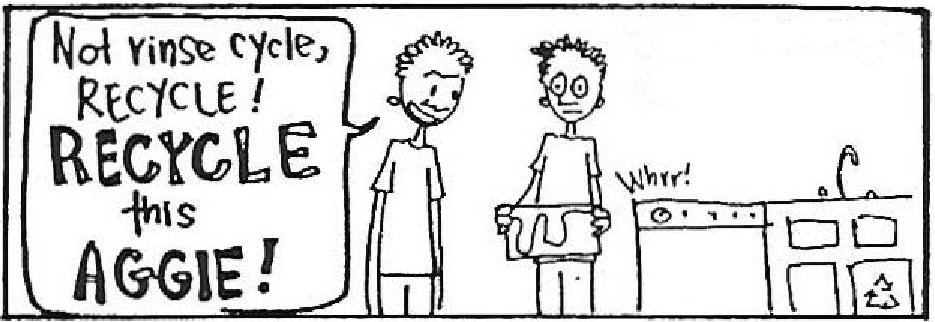
ARTS & CULTURE
Ongoing events, available resources at Mary L. Stephens Library
The library provides craft communities, monthly book sales, material kits and more
BY SAVANNAH ANNO arts@theaggie.orgto speak with other language learners. All skill levels are encouraged to attend, and no registration is required: simply show up ready to talk. English conversation groups are held each Monday from 12:30 to 1:30 p.m. as well as on Thursdays from 6 to 8 p.m. Spanish conversation groups are held on Mondays from 6 to 7:30 p.m. and Mandarin groups on Wednesdays from 6 to 7 p.m.
Another weekly drop-in event held at the library is open hours with the Davis Makerspace. Each Thursday from 9:30 to 11 a.m., the non-profit group provides tools like the opensource software Arduino, single-board Raspberry Pi computers, a sewing machine, craft wood and other various pieces of small equipment to visitors. Davis Makerspace — a group of builders, makers and programmers — encourages community members to stop by and show off their projects or to ask any questions they may have about how to use the tools offered.
Last on the list of ongoing events at the Mary L. Stephens Library is the monthly Friends of the Library Book Sale, hosted by volunteers and spanning three days. The sale begins on the first Friday of the month from 12 to 7 p.m., is open Saturday from 10 a.m. to 5 p.m. and on Sunday from 10 a.m. to 3 p.m. Being the final day of the monthly book sale, Sunday is “bag day,” meaning visitors are encouraged to fill a grocery-sized bag with books for $10. Find used books about poetry, cooking,
science, politics and more in the Friends of the Davis Public Library’s collection.
On top of the library’s in-person events, the Yolo County Library also provides a variety of online and material resources for members. Sign up for a free library card by visiting the Davis Branch with your ID and proof of California residency (a piece of mail with your address on it, for example) to gain access. With your card, the library opens up a world of possibilities: languagelearning programs, performing arts video collections, LinkedIn Learning, test-prep materials and access to The New York Times online.
In-person, Mary L. Stephens Library also offers interactive resources such as discovery kits for activities like bird watching, calligraphy, sewing, meditation and even ghost hunting. Each kit contains books, DVD tutorials and the necessary materials to get started with the project. Visit the library to explore each option, and if you have an idea for a new one, be sure to suggest it. By catering to a wide variety of interests, from knitting to language learning, the Mary L. Stephens Library encourages connection through shared hobbies beyond just reading. If you’re interested in enriching your free time, talking with a diverse group of people or improving your creative skill set, the local library just might be for you.

Four of the best classic literature film adaptations to watch
If you’re interested in classic literature but aren’t sure where to start, here are four film adaptations to get you on the right track
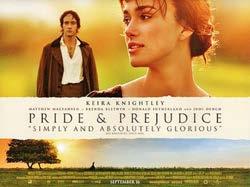 BY NATALIE SALTER arts@theaggie.org
BY NATALIE SALTER arts@theaggie.org
Reading classic literature is an undeniably enriching experience — however, the most famous of these novels can be daunting with their dense language and complex historical contexts. If this is a conflict preventing you from enjoying classic literature, a well-done cinematic adaptation of one of these books is a wonderful alternative to directly reading each one. Here are four of the best of these adaptations to add to your watchlist.
“Pride and Prejudice” (2005) dir. by Joe Wright Jane Austen’s most famous novel
has seen a number of adaptations and references throughout pop culture. While the best of these adaptations is hotly debated, the 2005 film starring Keira Knightley and Matthew Macfadyen has widely been hailed as one of the greatest. The story follows the stubborn and curious Elizabeth Bennet in her encounters with Mr. Darcy, a wealthy but unsociable man with whom she often quarrels. With an enchanting soundtrack, gorgeous cinematography, captivating performances and a truly memorable story at the heart of it all, “Pride and Prejudice” is more than just an adaptation — it is a love letter to Austen’s novel, understanding and reflecting on the characters with sincerity and palpable affection.
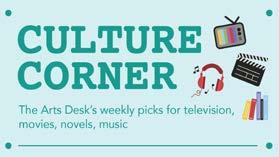 BY ELIZABETH WOODHALL arts@theaggie.org
BY ELIZABETH WOODHALL arts@theaggie.org
TV Show: “Dead to Me” by Liz Feldman (2019)
Emmy-award-winning show “Dead to Me” premiered on Netflix on May 3, 2019, and it went on to have three seasons, with the finale premiering on Nov. 17, 2022. The dark comedy depicts two grieving women who bond over the loss of their husbands. Jen (Christina Applegate) is a widowed real estate agent mourning the loss of her husband who died from a hit-and-run. Judy (Linda Cardellini) is in the same support group as Jen because she claims her fiance died of a heart attack. In reality, Judy conceals the truth: her husband is alive. The reason she lies

is to get close to Jen — someone who is inconsolable and resorts to anger when forced to face the truth of her husband’s passing. This series explores the intricate complexities of womanhood, friendship and grief while still maintaining a light tone for a considerably dark story.
Book: “Memoirs of a Woman of Pleasure” by John Cleland (1748)
Cleland wrote one of the first wellknown erotic novels in London in 1748 that features pornography in prose form. The story follows innocent 14-year-old Fanny Hill as she faces the death of her parents who passed away from smallpox. Forced to look for work after being left with no other fortune, she travels to London and unknowingly joins a brothel. It’s here where she deals with various sexual encounters — both heterosexual and homosexual — that shape the way that sex was perceived back in the 17th century. Cleland explores the hardship that many women faced when having to find work — and, weirdly enough, the various ways that female and

male genitalia can be described. He shows the complex relationship “prostitutes,” or sex workers, had with sex when choosing to commodify their bodies, while also exploring themes of solidarity within sex work. The author highlights the value of virginity and what it meant to be a woman at the time, trying to make it out alive and gain financial stability.
Movie: “One Day” dir. by Lone Scherfig (2011)
Based on David Nicholls’ novel in 2009, this romantic drama follows Dexter Mayhew (Jim Sturgess) and Emma Morley (Anne Hathaway) — two people who seem to be romantically interested in each other, but decide that they are better off just sticking to friendship. Over the course of 20 years, we see Dexter step into a television host personality while Emma becomes a school teacher. Even with so many failures to remain friends, it’s evident that two people who’ve known each other for over two decades could navigate the world without having

each other. Dexter becomes a player and falls from fame; Emma is stuck in a lifeless relationship. After many misses, it’s not too hard to imagine what happens next. Netflix recently released a TV mini-series, “One Day,” that is also based on its book and movie counterparts.
Album: “Rumors (Super Deluxe)” by Fleetwood Mac (1977)
This album is timeless; it transports the listener to the soft rock, drug-infused scene of the 1970s. Whenever I listen to Fleetwood Mac, it seems like they’re the kind of band who created music that was true to them — not just true to their time, but true to anyone who likes good music. With tracks like “Dreams” and “You Make Loving Fun” that forefront their iconic instrumentals, the bass guitar and drums, it’s hard to not be immersed in an atmosphere of tranquility and hope of what is to come. Other tracks, like “Go Your Own Way” and “Silver Springs,” put a spotlight on the romance between vocalists Lindsey Buckingham and Stevie Nicks. Their whirlwind romance could be seen throughout their time in the band, both on tour and even as of recent years,
“Emma” is backed by a brilliant cast that breathes life into the quirky and memorable characters and their various relationships. The film’s playful humor and intriguing twists follow the book incredibly accurately, and it captures the bright aura of Austen’s novel with ease.
“Jane Eyre” (2011) dir. by Cary Joji Fukunaga Charlotte Brontë’s famous novel

like their 2009 “Unleashed Tour” which released an expanded version of “Silver Springs.” Their tremulous relationship could be observed through these tracks of lost love, disappointment and loss. Stevie Nicks’ famous line, “You’ll never get away from the sound of a woman that loves you,” proves the lifelong struggle to be with Buckingham even as he went out and sought love elsewhere. This album has a history and is history, all in one.
memorable and impactful quotes to life with careful accuracy.
“Little Women” (2019) dir. by Greta Gerwig
Furthermore, the film is filled with heartwarmingly romantic scenes and iconic quotes that will live in your mind for weeks after watching.
“Emma” (2020) dir. by Autumn de Wilde
Another brilliant adaptation of one of Jane Austen’s bests is 2020’s “Emma,” starring Anya Taylor-Joy in the titular role of the affluent and confident Emma Woodhouse. Passionate about the art of matchmaking, Emma entangles herself in a web of flirtations, courtships and marriage proposals. Director Autumn De Wilde’s use of pleasant pastel colors throughout the film’s cinematography and set design creates a film that is as beautiful as it is entertaining. Likewise,
“Jane Eyre” is an icon of gothic literature that has experienced stunning longevity within academic circles. If the original novel is a bit too much of an undertaking for you, you’ll enjoy the 2011 film adaptation starring Mia Wasikowska as the protagonist Jane. She is swept off to become a governess under the purview of the mysterious Mr. Rochester, with whom she develops a complex relationship; however, she begins to discover that he conceals a troubling past. All of the gothic elements of the original novel are skillfully brought to life, creating a cinematic experience that is eerie and darkly atmospheric. “Jane Eyre” is subtle yet effective in its means of adapting the source material’s magnificent estates, shadowy forests and mysterious attics that harbor dangerous secrets. Furthermore, it brings the novel’s most
While director Greta Gerwig shot to global fame for her work on 2023’s “Barbie,” her adaptation of Louisa May Alcott’s “Little Women” may be some of her best work. The film boasts a talented cast to play its four primary roles: the stubborn and playful writer Jo, played by Saoirse Ronan; thoughtful and romantic Meg, played by Emma Watson; strong-willed and artistic Amy, played by Florence Pugh; and the gentle and kind-hearted Beth, played by Eliza Scanlen. Gerwig’s adaptation strikes the core of the original novel’s themes of sisterhood and pursuing one’s dreams, bringing each sister’s story to life and giving viewers a deeper understanding of each of their hopes and aspirations. The film’s use of color grading, careful costuming choices and strategic shifts between past and present further enhance the original story. The result is an adaptation that does justice to its source material whilst also being deeply emotionally moving and cinematically beautiful.
Social media creators display the many facets of Davis
Davis-based online creators discuss what their social media pages aim to achieve
BY LAILA AZHAR features@theaggie.orgWhen first-year managerial economics major Jenny Le received her UC Davis acceptance email, she was ecstatic. Not knowing much about the school, and unsure if she’d be able to tour in person, she turned to social media to research.
“I remember binge-watching ‘Day in the Life of a UC Davis student’ videos,” she said. “There were a couple times during my first quarter where I’d recognize something on campus from a vlog I’d seen.” Le isn’t the only one to use social media as a research tool. Today, half of the adults in the United States get at least some of their news from social media.
Many teenagers opt to use social media apps over search engines.
“In our studies, something like almost 40% of young people, when they’re looking for a place for lunch, they don’t go to Google Maps or Search. They go to TikTok or Instagram,” Prabhakar Raghavan, Google’s senior vice president, remarked at a tech conference in July of 2022. With the rise of social media as an important source of information, Davis-based accounts aim to display all that the town has to offer.
To third-year molecular and medical microbiology major, Aida — known as @aidaonstem on Instagram — providing this information, especially to high school students looking to learn more about UC Davis, is the best part about running her account.
Her Instagram reels capture her experience as a pre-med student, and often provide useful advice, such as academic affirmations or study tips, to other students.
NOVA MAI / AGGIE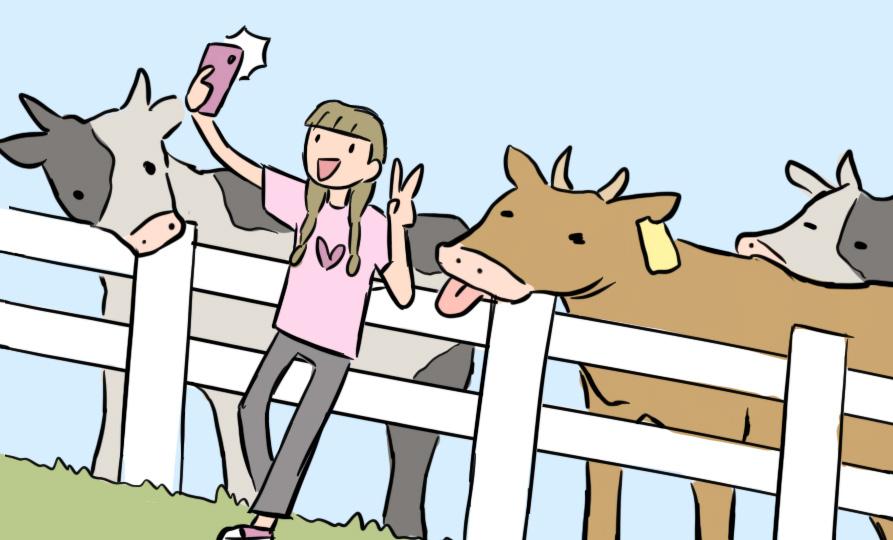
She aims to “leave behind the toxicity that surrounds higher education, and reclaim it as not only this privilege, but this incredible thing that we’ve achieved.” For this reason, her content is uplifting and motivational.
Sharing beautiful videos filmed on UC Davis’ campus, from the arboretum to a biology lab, she portrays Davis in a positive light, encouraging students to find joy in their studies and appreciate the environment they’re surrounded by.
“University is what you make of it,” she said. “I want students to realize that even on their hardest days, they earned their spot here. Every student brings something to this school.”
Davis-based social media accounts aren’t exclusive to the UC Davis student body.
@Mydaviscalifornia, for example, shows off the local restaurants and
businesses Davis is home to. Started three years ago as a way to document the events in town, they post videos filmed from different spots around town on their Instagram and TikTok accounts, from Woodstock’s Pizza to the Gorman Museum.
Their website includes guides to the sushi, sandwiches, retail and fitness the town has to offer.
“If someone finds our page, they could see fun events, good places to eat and drink and maybe even some pro-tips of what to do when visiting/ living here,” the owners of the page summarized through Instagram DMs.
Perhaps nothing shows off the variety of events in Davis than Good and Weird Davis, the community calendar and Instagram page documenting Davis’ underground scene.
When things started opening back up again after the pandemic, the
calendar’s creator, who preferred to remain anonymous, noticed that there wasn’t a central place for people to find events.
“I was making a calendar for myself,” he said, “so I thought I’d share it with folks.”
As their Instagram bio reads, Good and Weird Davis advertises “diy [do it yourself], weirdo, radical, art, co-op” events. From pro-Palestinian mobilizations to open mics and concerts, one glance at the Google Calendar reveals the wide variety of activism and art Davis has to offer.
In sharing these events, the Good and Weird Davis creator hopes to encourage people to start their own events. “It’s easy to rely on larger entities to organize your fun time for you, but it’s really not necessary,” he said. “We’re all pretty capable of organizing a lot of fun for ourselves.”
Davis-based social media accounts all display different sides of the town. From the experience of a STEM student at UC Davis to the local businesses and the underground scene, together they paint a picture of the variety Davis has to offer.
As the @mydaviscalifornia creators put it, “Davis has so many small parts that make up the whole. It truly feels like there’s something for everyone.”
Despite the variety of perspectives and focuses, these creators all have something in common — their love for Davis shines through in their content.
“We‘re just some Davis nerds who love Davis,” the @mydaviscalifornia creators described themselves as.
Similarly, Aida expresses her love for the town through her videos. “I want my page to be a really positive reflection of what not only school can be like, but also what Davis can be like,” she said. “I think it’s very helpful for us to have content about Davis that shows it from this lens.”
She’s maintained this positive outlook, even in the face of social media’s negativity.
“People can take the internet and use it as this very easy way to make something negative when you’re trying to share this really great experience that you’re having,” she said, describing the negative comments she received on a video about being a woman in science. “I just remind myself that the negativity they’re putting out there is not a reflection of myself, but rather a reflection of them.”
While the internet comes with its downsides, the social media creators documenting Davis have managed to create positive online spaces that encourage their audiences to appreciate and become more involved in our town.
Davis Rave Company: reinventing Davis nightlife
How Davis Rave Co. is cultivating a greater live music scene in a small town
BY LILY FREEMAN features@theaggie.orgWhen a long academic week comes to a close, UC Davis students can always look forward to mornings spent perusing the Farmers Market and afternoons reading in local cafes. Once the sun sets, however, they’re stuck settling for one of few bleak options as they decide on their Friday night ventures.
Quality nightlife is sparse in Davis, especially because most of the town’s establishments close before 9 p.m. Caden Velasquez, founder of Davis Rave Company (Co.) and recent UC Davis graduate, is looking to fill this gap.
Created in Jan. 2023 by UC Davis Students, Davis Rave Co. pushes the boundaries of creative expression and live music, from throwing elaborate concerts to festival-like events. They promote local artists while giving the community experiences that go further than your average college party.
“There were very few opportunities for the high number of talented people — musicians, producers and DJs — to show their work and perform on a big stage,” Velasquez said. “This is where I saw that I could make an impact.”
What began as an Instagram account to promote local musicians in the area is now a team of student musicians, producers, videographers and content creators all dedicated to cultivating a greater nightlife scene in Davis.
“I established a reputation where if I promoted an event, it would be a good one,” Velasquez continued.
“Then, I realized that I could host the events myself.”
Velasquez and his team tested the waters, putting together shows with lineups of several musicians at local venues and houses. Davis Rave Co.’s first show featured just two DJs and a saxophone player at Sophia’s Thai Kitchen.
“We actually attracted a huge crowd,” Velasquez said. “I still go to Sophia’s today and people will be talking about it. After that, I knew that there was potential here. There’s so many people who want to see local artists do their thing.”
From there, the team grew, and their ambitions did too. With the desire to host an event that could accommodate hundreds, but a lack of affordable places in town to make that happen, Davis Rave Co. set out to create venues from open space.
In Oct. 2023, residents of The Domes, a living co-op near campus, reached out to Velasquez with a vision for what could be hosted on their grounds. Davis Rave Co. then devised the Dome Rave.
On the night of the event, Aaron Helali, fourth-year biological science major and production director of Davis Rave Co., said that he and attendees walked into what felt like a “festival ground.”
With vibrant stages, strobe lights and several 16-foot inflatable LED mushrooms placed all around the space, the team designed a visually captivating atmosphere. To keep students safe, they established a security team — and with the goal of making the night especially memorable, they even hired a flash
tattoo artist.
“It’s the holistic approach that we take toward planning events that makes us stand out,” Velasquez said. “We’re not a party group, we’re a creative agency.”
With over 500 attendees, the Dome Rave exceeded Velasquez’s expectations.
“It was more than live music — it was knowing that our team created an experience that a student in Davis had never had before,” he continued.
The Dome Rave grew the Davis Rave Co. name, where the group’s priority was next to keep the momentum going. They began putting together as many performances as possible in an effort to consistently give students something to look forward to.
“Davis Rave Co. is a lot broader than the name really suggests,” Helali said. “With our wide range of musical talents, we have everything from jazz to EDM to ‘80’s themed.”
Renting out smaller venues such as Rock Band University and the Root of Happiness Kava Bar, the team has been putting on weekly shows with varying admission fees since Jan. 2024.
One problem that Davis Rave Co. faces is the proportion of eager attendees to the space that accommodates them. Not all shows can be like the Dome Rave, and many Davis venues don’t have the capacity to host hundreds of students.
Nola Zimdars, a third-year design major and attendee of the Jazz Show hosted on Feb. 2, said that while she enjoyed the event, she also spent a good portion of it waiting to get inside due to the venue quickly reaching
maximum capacity. Despite the fact that most had already paid $20 for a ticket prior to the event, many spent a lot of the night in line. “It definitely could have been organized better,” Zimdars said. “For something that’s student-run in a town where there’s not much else going on, though, how much can I really complain?”
Zimdars further recognized that Davis Rave Co. is doing the hard part. “Orchestrating an event with artists, lights, sound and lots of rowdy students is going to come with problems,” she said. “I appreciate the hard work that is going on behind the scenes, but they need to better prepare for their events as they grow in popularity.” The Davis Rave Co. team is learning from each show that they put on, according to Helali. “There’s so much more to it than just a party,” Helali said. “We are always asking ourselves, ‘What can we
improve?’ and ‘What did we do well?’ We get to harbor the vibe, and we’re trying to make it a good one.”
Velasquez says that this is just the beginning of Davis Rave Co., where they are currently working toward putting on large-scale shows similar to the Dome Rave and even a tour across California.
“Our vision is to set the stage for freedom, love and wonder, which can be achieved in so many different ways,” Velasquez concluded. “It’s a process where we’re taking baby steps, but we’re also thinking big. We don’t want to bite off more than we can chew, but we’re also being ambitious with what we can achieve.”
Those who want to find upcoming shows and purchase tickets can go to the Davis Rave Co. website. Community members can specifically look forward to their upcoming show on Feb. 24 at 6 p.m., where Gudfella and DJ Mandy will be headlining at The Melon Ball.
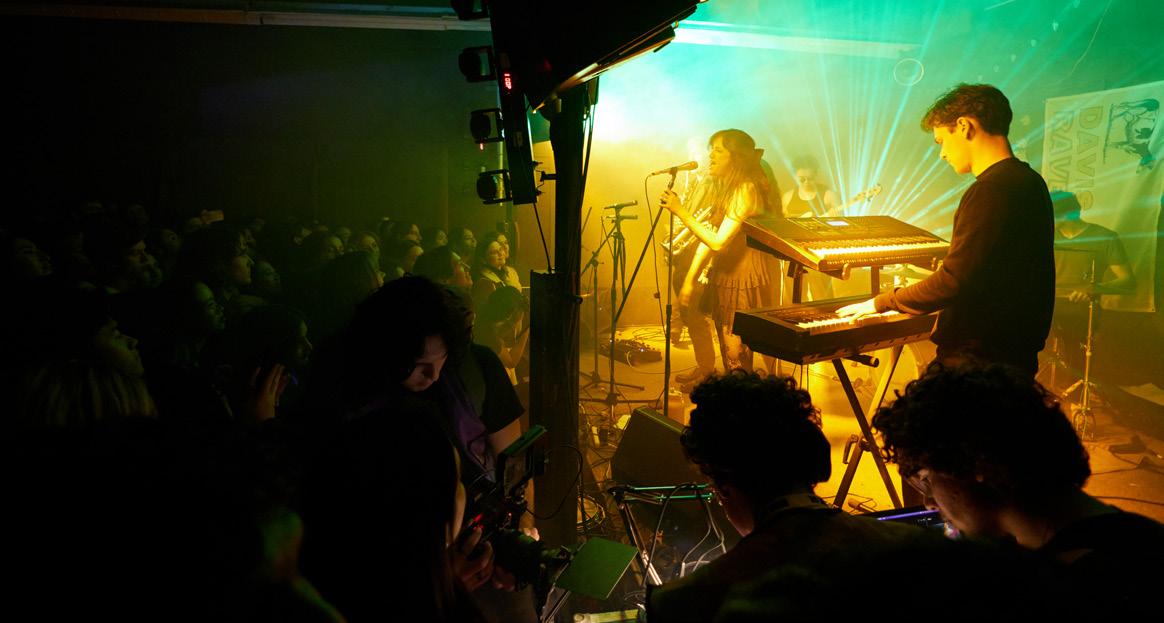 BY LYNN CHEN features@theaggie.org
BY LYNN CHEN features@theaggie.org
For
Lunar
and networking mixers to gain a deeper understanding of potential career paths in their field.

Professionals attending these events include faculty from the Food Science and Technology department as well as experts from businesses including Pepsi and Blue Diamond. Furthermore, the club also offers industry tours for undergraduates to learn about the food-making
innovation company based in California. Additionally, the club is a contributor to the UC Davis community. For the upcoming Picnic Day, the Food Tech Club booth is planning to give out ice cream that they made from scratch.
A rigorous procedure will be used to ensure that the icy treats can be safely consumed by the public, according
a fourth-year food
and vice president of the
and
they will come together and develop a food safety plan for making ice cream,” Jian said. After the plan is made, the team will then collaborate with the Pilot Plant — a food processing facility on campus — and their manager to produce the ice cream on a larger scale.
Other than educating members on topics in the field, the club is also dedicated to teaching students about other important subjects related to the discipline.
“Recently we had a cultural appropriation of product development talk,” Gupta said. “People came and basically communicated important questions like, ‘What is the difference between appropriation and appreciation of a culture’s food?’”
Overall, the Food Tech Club can be an enriching experience for students pursuing the field.
“Hopefully, [members] meet other food science majors and build connections that take them outside of the club,” Jonah Messinger, a secondyear food science major and external relations chair of the Food Tech Club, said. “I think hearing from the guest speakers we bring in and touring different industries and factories helps people see [their careers] more clearly.”
Super Bowl LVIII: Kansas City Chiefs become back-to-back Super Bowl champions
Chiefs beat the San Francisco 49ers in overtime, 25-22
BY CAROLYN (CARI) FENN sports@theaggie.orgAs football season officially comes to a close, the Kansas City Chiefs become the first back-to-back Super Bowl champions in 19 years. The last team to accomplish this type of win was the New England Patriots, following the 2003 and 2004 seasons. The game was thrilling as the Chiefs defeated the San Francisco 49ers in overtime.
The game was challenging as neither team had much luck scoring touchdowns in the first two quarters. This caused them to turn to field goals instead. It wasn’t until the Chiefs scored a touchdown in overtime with a three-yard pass by quarterback Patrick Mahomes to wide receiver Mecole Hardman Jr. that they advanced.
Nonetheless, even with a loss, the 49ers put on a strong performance that had the Chiefs trailing for most of the game.
After a scoreless first quarter, the 49ers made the first points of the game, taking a 3-0 lead after a 55-yard field goal by kicker Jake Moody. The field goal gave the 49ers a lead and Moody the record for the longest field goal in Super Bowl history. The previous record was 54 yards, held by Steve Christie of the Buffalo Bills after Super Bowl XXVIII.
The 49ers continued to extend
their lead against the Chiefs with a trick play that ended in running back Christian McCaffrey scoring a 21-yard touchdown. Quarterback Brock Purdy threw a cross-field throw to wide receiver Jauan Jennings, who then passed it back across the field to McCaffery, who made his way to the endzone. This stellar compilation solidified the 49ers lead over the Chiefs by double digits with a score of 10-0.
While it appeared as if the 49ers were going to shut out the Chiefs for the whole first half of the game, Chiefs kicker Harrison Butker was able to get the Chiefs on the scoreboard with a 28-yard field goal. At the end of the first half, the score was 10-3, with the 49ers leading. During the first half, the 49ers appeared to be the stronger team, as the Chiefs were unable to find their rhythm and connect the way they had throughout the season. From fumbles to poor defense, the Chiefs struggled to get points on the board.
Midway through the third quarter, Chiefs kicker Harrison Butker broke 49ers kicker Moody’s short-lived record for the longest Super Bowl field goal. The 57-yard field goal also narrowed the 49er’s seven-point lead to a mere four-point lead. Then, in the last three minutes of the game, the Chiefs capitalized on an error by the 49ers’ wide receiver Ray-Ray McCloud as
quarterback Mahomes was able to throw a 16-yard touchdown pass to Marquez Valdes-Scantling to give them a 13-10 lead.
The real competition for the Super Bowl title began during the fourth quarter of the game, with neither of the teams securing a comfortable lead to win the title. The 49ers returned early in the fourth quarter with Purdy connecting with Jennings to score a six-yard touchdown. Moody missed the extra point, giving the 49ers only a three-point lead, 16-13.
The rest of the quarter consisted of back-and-forth field goals between kickers Moody and Butker until the quarter ultimately ended 19-19, causing the game to go into overtime.
It was only the second time in Super Bowl history that a game was tied after regulation, and the first time being played under the new overtime rules that ensured both teams got possession of the ball.
In overtime, the 49ers won the coin toss and gained first possession of the ball, securing a three-point lead with a 27-yard field goal by Moody. Yet, in the end, the Chiefs were able to complete their impressive comeback after the touchdown by Hardman Jr., making the Chiefs the Super Bowl Champions yet again.
While the 49ers played a stronger first half than the Chiefs, two key
14 million bets and $307 million

mistakes in the second half seemed to have cost them the Super Bowl title. The first mistake was the failed punt return by return specialist McCloud that gave the Chiefs a touchdown. The second was the decision to take first possession after winning the coin toss in overtime. Due to the new rule allowing both teams a chance to have possession of the ball in overtime, the decision ended up costing the 49ers the game as they were only able to score a field goal. Despite the 49ers’ lead in the game making them likely to win the Super
Bowl, the Chiefs were able to make a comeback and win it all, with Mahomes securing his third Super Bowl win after just five seasons in the NFL.
As the Chiefs begin to create a dynasty similar to the one established by the Patriots under legendary quarterback Tom Brady in the early 2000s, they aim for a three-peat victory, something that not even the great Brady accomplished during the Patriots’ reign. As for how long the Chiefs can keep pulling Super Bowl victories, only time will tell.
for Super Bowl LVIII
Sports betting records shattered as viewers place billions on the title
 BY MI’ZAUNI REESE sports@theaggie.org
BY MI’ZAUNI REESE sports@theaggie.org
With the rise of team loyalty and affiliation, sports events have grown increasingly popular. Some fans take their devotion to a sport or team even higher by engaging in sports betting, putting their own livelihoods on the
STORMS
FROM FRONT COVER
“Year-round, the city has staff on ‘standby,’ which means someone is available 24 hours a day, seven days a week if there are public works emergencies after regular working hours,” Heinig said. “During particularly windy and/or rainy weather, the city has additional staff to join the standby group to ensure inlets stay clear and roadways clear of obstructions.”
The city is also predicting additional heavy atmospheric storms throughout February. Heinig said that the city is prepared to combat any unexpected changes with forecasts.
“Last year, during the nine atmospheric river events our region experienced, city staff worked 12hour shifts during the storms,” Heinig said. “We do not anticipate that this next storm will require that level of response, but we are ready should weather patterns change.”
EDUCATIONFORUM
FROM PAGE 2
Though Haney works with SSI daily, LeDuc said that parents of children with disabilities have become knowledgeable about the system.
“[While] we have an expert come speak, I really believe that our families are our experts,” LeDuc said. “Their lived experience and sharing it with each other is usually most helpful.”
Attendees asked Haney and each other numerous specific questions, and the parents were able to relate and offer one another advice. One attendee shared that people applying for SSI should maintain their benefits carefully.
“I live in fear that I’ll lose my son’s SSI benefits,” he said. “I worry that I’ll write something down wrong or
line. Thus, the recent growth in viewers and attendees of games coincides with A recent increase in sports betting worldwide. With celebrities such as Drake and Offset betting well over $1 million in Super Bowl LVIII, this is just one of the most recent examples of high bidding trends we see nationwide. Through the estimated 70 million individuals who
incorrectly record something. It’s scary — sometimes when you lose SSI, you can’t get it back.”
LeDuc spoke about long-term solutions for the complications of disability resources.
“Funding is an apparent evil of the situation,” LeDuc said. “It comes down to money, it comes down to staff. There’s been a huge staff deficit since 2020, impacting this community and our work. Our families are in need and they make do with what they have, but they need more support. It’s a tough system. I [only] know half of it and I [still] know more than most people.”
AI
FROM PAGE 3
“Personally, I think teachers should be open to using [AI] more. If students decide to use this tool to cheat, then it’s on them and it will reflect on their exams and career,” Velasco said. “If everyone finds a productive way of using it, then it can help benefit students and prevent them from cheating more.”
Apart from education — whether people see it as a threat or not — AI and other digital technology have been used in the workforce as well, causing another wave of concerns: what if AI were to replace humans in the labor market?
According to a study done by the McKinsey Global Institute, health, STEM, transportation, warehousing, business and legal professionals are projected to be growing under AI, while office support, customer service, sales, production work and food services are the most negatively impacted by AI acceleration.
The research found that the labor market saw 8.6 million occupational shifts with most people leaving food services, in-person sales and office support for other occupations from 2019 to 2022. The study also suggests that this pattern will continue into the future due to AI’s impact.
took part in Super Bowl betting, over $23 billion was wagered on the Super Bowl, about 35% higher than last year, according to the American Gaming Association. In spite of economic downturn and inflation, this spike in gambling may point to a bigger trend as it has even been taken up by teenagers and tweens due to weak age security policies.
Although the United States’ economy is starting to level out again since the COVID-19 pandemic, it is still in better shape than what was predicted by forecasters. Still, with funds going to foreign conflicts and individuals struggling with jobs, people are doing what they can to pinch pennies. Sports betting and gambling around the world have proven to add hardship to these individuals who would otherwise save their money —- all for the potential to win more money.
Within the past decade, gambling has become more accessible than ever. Lotteries, casinos and horse races are now a thing of the past as gambling apps have come to fruition. In 2018, the Supreme Court lifted the ban on sports betting that caused the market to skyrocket as loyal fans were willing to put their money where their mouth is for the sake of their team’s reputation.
However, sports betting has in some cases gone from a niche hobby to a common “side hustle” for many college-aged individuals. With a simple
Although AI will still change the way many jobs work — such as having AI assist humans in their tasks — there are still things that give society hope that we will not be replaced.
“It all comes down to consciousness. [Humans] can hold consciousness without thinking and feeling. For example, this is what happens when you meditate. Machines cannot do that, as far as [researchers and scientists] know,” Hilbert said. “Thinking is an information process, and consciousness is something different.”
Without consciousness, AI is still not capable of doing everything humans can do, meaning our jobs won’t be replaced by AI just yet.
AI definitely comes with repercussions, but it’s important to understand that the machine itself is not responsible. Any kind of digital technology is not inherently good or bad, nor neutral, the responsibility in the way it’s used falls in the hands of us humans. In other words, it’s socially constructed in that humans shape technology, not the other way around.
Hilbert suggested that people use AI based on their different interests and intentions, but that “it’s always the human at fault” whether it comes down to the data AI uses or the way it’s used because the machines “have no agency” in the decision of what they are used for.
With all this being said, AI is also used for things like helping people connect with others. For example, SignAll, a company based in Hungary, created a machine that is able to read American Sign Language and translate it into spoken and written language in an attempt to break communication barriers between people.
But this is just one example out of many, ranging from saving the bees and using it to predict climate change’s effects to cancer screenings and reducing inequality and poverty.
However terrifying it may feel to think about the direction we are heading in with AI and other digital technology, it’s best that society
wager, often under $20, fans have the chance to increase their winnings by more than tenfold. The reason for this exponential growth in gains is the increased complexity of these bets.
What originated as a simple “my team will beat your team” mentality has evolved into complex, multifaceted bets that decrease the odds of winning, but make for a greater payout. Known as parlays, these multi-wager bets range from a team winning by a specific number of points, the sum of both teams’ scores equating to higher than a specific number or individual players performing to a certain level — such as throwing a minimum number of yards.
The intricacy of parlay bets allows for true artistry to show. A gambler must have extensive knowledge of not only the team, but individual players, average performance, the skill level of the opposing team and much more. It is no longer a matter of “my team is better”; now, the gambler is betting on their own personal expertise of the league and its players. Additionally, there are now bets on sporting events that have nothing to do with the actual game. Many collegeaged individuals made bets amongst friends during Super Bowl LVIII on things such as: “I bet you Taylor Swift will be on camera eight times during the Super Bowl.” Sports betting has become so popular that many individuals who
continues to talk about it, research it and be open to adapting to it. It can be useful while being regulated by laws and governments. “Be mindful about [AI], talk about it, use it and then empower yourself with it; have a companion on your side that can help you [personally] and can help you shape the world,” Hilbert said. “If there are problems that you aren’t satisfied with [in the world], then we can use these tools to help make it a better place.”
STUDENTVOTERS
FROM PAGE 3
Political education and participation seems to be a major factor in whether or not people choose to vote.
UC Davis student Isabel Wade, a second-year design and psychology double major, shared her thoughts on the role that young voters play.
“I think voting is an important part of our American institution because it upholds democracy,” Wade said. “I am particularly excited to vote in this upcoming election — for the first time — to play my part in making a positive change in society.”
Strictly due to the percentages associated with the youth vote, there is a large number of young Americans that choose not to vote. Whether it’s because of discontent with the American government system, a lack of political education or a different reason, the youth vote has a long way to go before it surpasses other age demographics.
Despite this, there is a large amount of research being done about how political activism has changed in the face of a rapidly growing technologybased world, with Generation Z being at the forefront of much of this activity. This age demographic tends to be politically active and passionate about humanitarian issues; however, this does not always reflect in the ballot numbers.
have no prior experience in betting or limited knowledge of the sport are participating. For Super Bowl LVIII, there was a $460,000 bet nationwide on Travis Kelce, with a current average of 0.47 on receiving touchdowns per game played in his career, which is a shocking statistic for the amount of money betted on him. This large bet can be due in part to his recent fan attention for dating singer Taylor Swift. As well as newcomers, sports betting has even reached people who don’t consider themselves to be sports fans. Rapper Rubi Rose won $1 million betting on Super Bowl LVIII, saying “have faith,” and then proceeding to shout out her sports betting app of choice. Memes flooded social media platforms with jokes about parlays and the Super Bowl, such as, “She not getting a Valentine’s day gift if this Super Bowl Parlay don’t hit”. Sports betting is starting to become the new norm in many people’s lives with its ever-changing rules and the addition of new ways to play. Everyone seems to be getting in on the action, but who’s to say this is a necessarily positive trend when any form of gambling is involved? Nonetheless, sports betting is on the rise, and we are certain to see more of this in future games.
“Young voters are passionate about the issues that impact them. That’s why they’re at the forefront of our community-based activism,” Nile Blass wrote in an article for the League of Women Voters.
“Research suggests that Gen Z is the most likely generation to boycott a product, company, country or state because of an ethical stance; only one in five Gen Z-ers would work for a company that doesn’t share their values, and 70% of Gen Z-ers are involved in at least one social or political cause.”
UC Davis has many resources for students looking to vote in upcoming elections. Aggie Votes offers election information, voter resources and voter registration information. Students have access to a great deal of information and material to get informed leading up to the presidential election in November of this year. There is also information about where to find ballot boxes on or near campus, as well as advice about where to register as a student living in their college town.
“The notion that young people’s perspectives aren’t valuable in politics is absurd. We are the generation that will feel the impacts of today’s policy for the longest,” Erin Wade wrote in an article for Forbes. “That’s why it’s so important for young people to take advantage of every opportunity we have to influence policy and why it’s important that colleges and universities make intentional plans to increase nonpartisan democratic engagement and student voting.”
No matter the reason for the low percentage of young voters in America, UC Davis students are encouraging their peers to cast their ballots in this upcoming election and exercise their democratic rights. Seeing as UC Davis prioritizes giving its students voter resources, students should have no trouble finding where and when to submit their votes this November.
Sudoku
Enter digits from 1 to 9 into the blank spaces. Every row, column and 3x3 square must contain each digit. Each Sudoku has a unique solution that can be reached logically without guessing.
Crossword
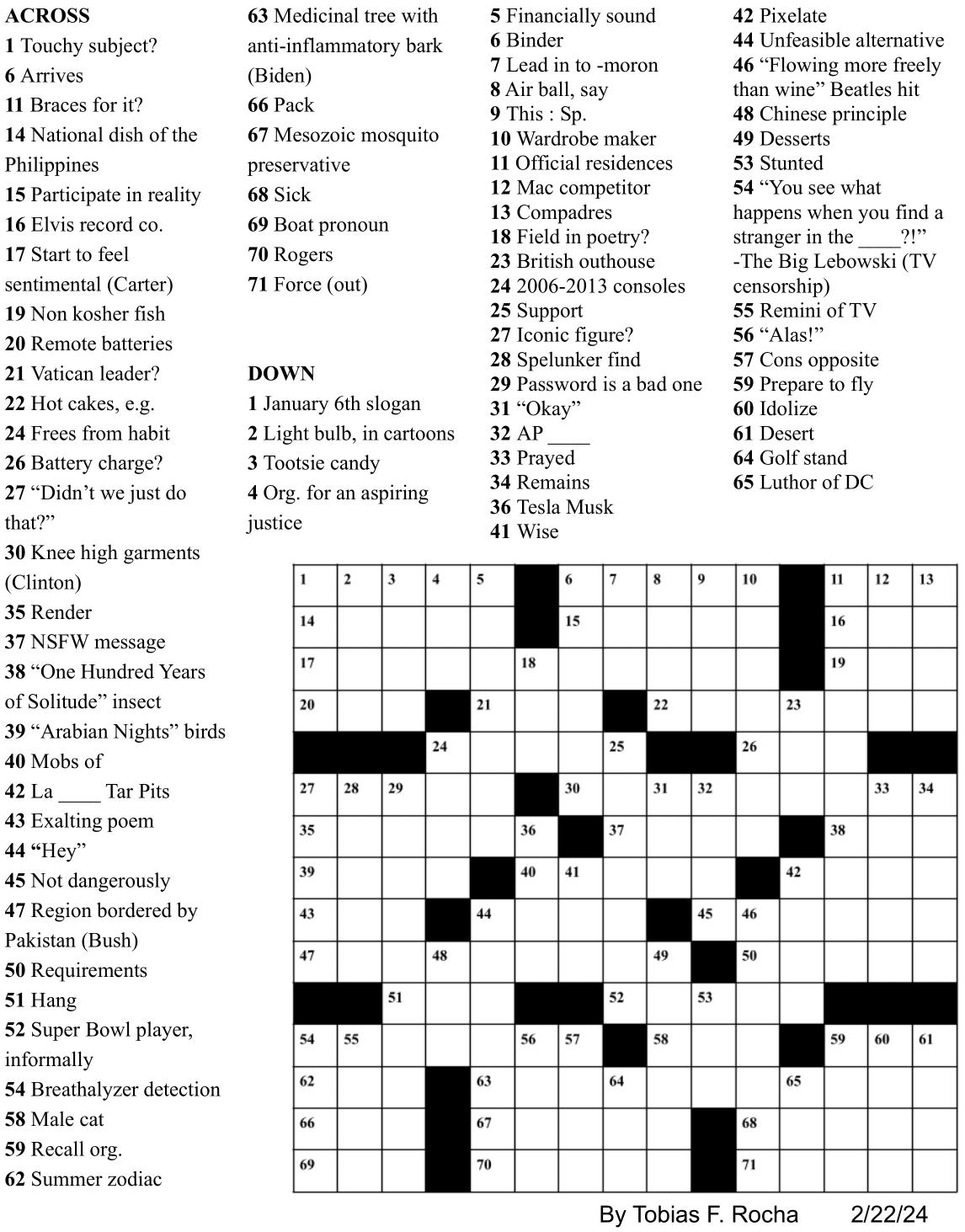
HUMOR
The haunting story of a bicycle thief
BY ALLISON KELEHER adkeleher@ucdavis.edutook out his notebook and whispered into my ear, “Someone stole my bike. I had to run here!”
I just yawned in response. After class, I overheard a conversation on the outside steps of the lecture hall and the rumors of recent robberies. Apparently, bikes have been getting stolen on campus pretty frequently since the quarter started, disappearing in the middle of the night. How anyone could find the energy to steal a bike at 3 a.m., I don’t know.

NATALIE CHENG/ AGGIE
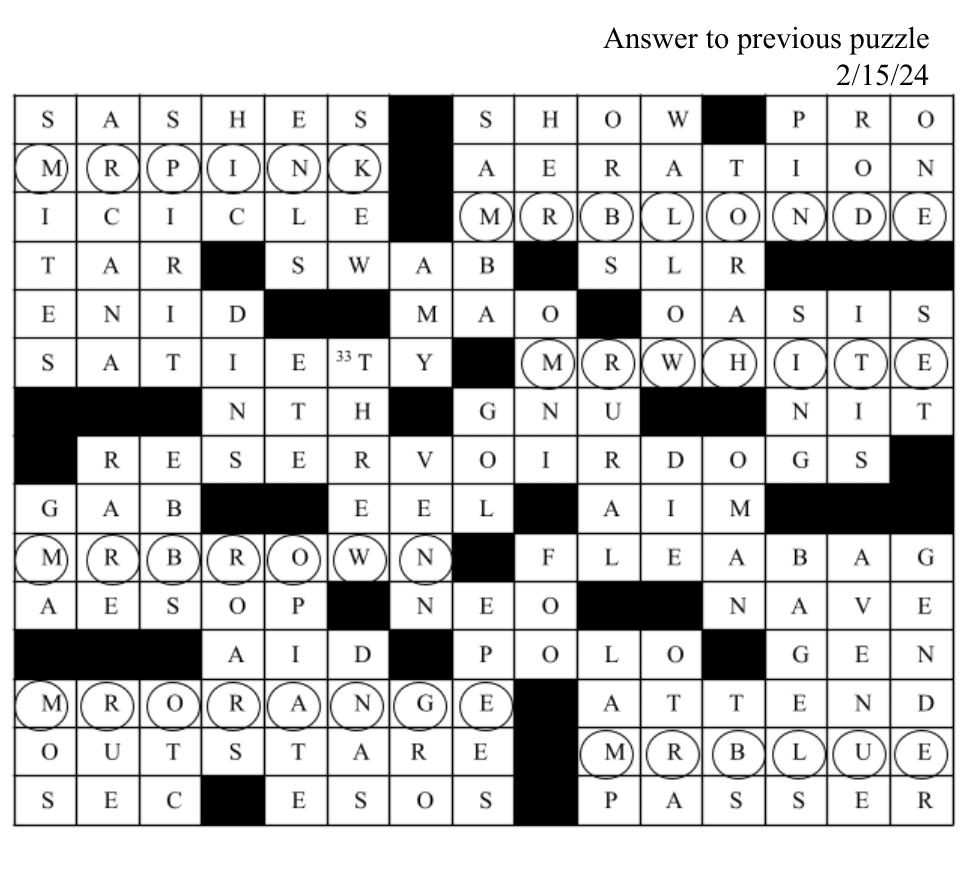
HUMOR
Bits of Davis: Lazzzzi Cow

Office hour panic
the place. My 7:30 a.m. chemistry lecture leaves me waking up more tired than I’ve ever been — even if I get 10 hours of sleep. Not that I’ve ever tried going to bed early. I’m just assuming.
What’s even worse, I can’t even take my mid-lecture nap, forced by friends to sit in the front row. One of these friends, Sean, is very serious about his education and has never missed a class. One time, he had the flu and was still in lecture, covering his cough with his textbook. Even with this display of consideration, It didn’t work — I got the flu the next week.
Knowing Sean, imagine my surprise when he arrived 20 minutes late to class on the very first day of the week. I wasn’t the only one to notice his sudden lack of timeliness because he wasn’t exactly subtle; he barreled down the aisle to the front row, huffing and puffing the whole way.
“Sorry I’m late, professor!” Sean yelled. The professor simply waved away the interruption. He quickly
At the next lecture, my friends were buzzing as I took my seat. “Did you hear that Gary May’s bike has been stolen?!” His prized possession, a blue race bike with tassels on the handlebars and a bell that says “Moo” was gone. You couldn’t avoid the news if you tried — no one could stop talking about it the entire day. Apparently, Gary May was sending out a special Aggie squad to hunt down the mystery bike thief. I couldn’t even find respite when I was trying to go to sleep, unable to block out the noise of my roommates’ conversation. Jeez, I thought, this is what they’re spending my tuition on?
My alarm woke me up with a fright the next morning, and my sheets were drenched with sweat. I rubbed my eyes and rolled out of my bed. ONTO A PILE OF BIKES.
What is happening? I looked down at my hands and was met with the familiar black substance coating my fingers — grease. The realization came to me fast. Oh no. I’m the bike burglar. That explains the bolt cutters I
found in my bed. These bikes have got to go, now. I opened my dorm room door and propped it open with a bike before starting to wheel all of the bikes out in a frenzy. Hopefully no one is awake at this hour.
Just when I was starting to feel safe, someone in the hallway asked, “Is that my bike?”
“NO!” I dropped the bike and started running. I think my fight or flight kicked in, and I chose flight. As I was running, I felt my mental state decline; all I could think about were bike gears and U-Locks. My ability to make rational decisions no longer existed, and I continued sprinting toward an unknown destination. Soon, I could hear the sirens — closer and closer by the minute. The Gary squad was coming for me, riding their bikes in V formation. To escape my fate, I jumped into the Arboretum waters, and the frenzy ended.
Gary May personally attended my psych ward and expelled me from the university. Apparently, he didn’t like that his tassels got wet.
Disclaimer: (This article is humor and/or satire, and its content is purely fictional. The story and the names of “sources” are fictionalized.)




SCIENCE AND TECH
Rejection is associated with higher levels of brain activity in individuals who tend to ruminate
Increased electrical activity and blood flow occur in parts of the brain associated with identity, especially in adolescent girls
BY KATIE HELLMAN science@ucdavis.eduIt’s common for people to ruminate from time to time. When you ruminate, you repetitively obsess over negative thoughts that aren’t typically conducive to solving a problem.
A UC Davis study has found that ruminating brains display different patterns on an fMRI scan compared to those that are less prone to excessive worrying. This trend has been most prevalent in adolescent girls.
The study, published in the journal “Developmental Cognitive Neuroscience,” specifically aimed to evaluate the effects of social rejection and how they relate to neural responses. The participants consisted of 116 females aged 16 to 19 who were asked to self-report their tendency to ruminate after receiving fake positive
NOSLEEP
FROM PAGE 3
But those who spend their nights studying instead of sleeping may find that their performance in academics does not improve. This is because the hours of sleep you get and your physical and mental well-being go hand-in-hand.
Ana Jauregui, a fourth-year genetics and genomics major, recognizes the importance of a balanced schedule.
Jauregui shared that she does not easily feel impacted by the pressure of school. Instead, she makes sure to prioritize her study habits in order to reduce stress for nights that may be overwhelming.
“I try to study periodically,” Jauregui said. “I don’t cram everything all in one day before [a test], so I don’t really do anything differently. I might just do the study guide the night before, but that’s it.”
Students who have additional commitments on top of school, like Genesis Dominguez, a first-year anthropology and art history double major, may especially struggle with finding stability in their routines.
“The biggest thing that affects
and negative feedback from peers.
“Rumination is a significant risk factor for psychopathology in adolescent girls and is associated with heightened and prolonged physiological arousal following social rejection,” the study saidreads.
“Results of this meta-analysis indicated that people with greater levels of rumination show heightened neural activity” in parts of the brain that “are hub regions of core default mode network (DMN) known to be engaged during self-related processing such as retrieving self-knowledge, experiencing self-conscious emotion, and retrieving autobiographical and episodic memory.”
To obtain these results, the study participants were asked to pick 30 photos of teenagers that they would feel comfortable talking to. While in the fMRI machine, which detects electrical activity and blood flow
[my sleep is] working, because it gives me less time to do my assignments,” Dominguez said. “I now have to adjust everything to my schedule, even though [my job] is super flexible.”
The effect of having commitments is often having to sacrifice or reduce other aspects of your life.
“I’ll cut out certain things,” Dominguez said. “I’ll cut out gym time, and sometimes breakfast, I’m not going to lie. Because it’s better for me to get more sleep rather than eat more. Food is something I can carry with me on the go, but sleep is not.”
Everyone’s situation is different, but Dominguez advises incoming freshmen to beware of how many commitments they take on.
“I wouldn’t recommend working in your first year, if you can help it, because it does take away from a lot of other stuff, including sleep,” Dominguez said. While our commitments are important facets of our lives, sleep is crucial. It gives us the energy needed to seize the day as the best versions of ourselves.
PRESERVATION
FROM PAGE 3
changes, the participants were then told which of the teenagers in the photos would and would not want to talk with them.
In the brain regions that define who we are as people, greater blood flow and electrical activity were identified when the girls were faced with rejection. This association was also stronger in the participants who had reported higher rumination tendencies.
Amanda Guyer, professor in the Human Development and Family Studies Unit of the Department of Human Ecology, commented on how these brain patterns relate to specific ways of thinking.
“Some of [these patterns] are related to depression and anxiety and other tendencies such as low selfesteem,” Guyer said. “Some of the brain regions that we were looking at are involved with certain cognitive
Lauren Toyne, a fourth-year wildlife, fish and conservation biology major, shared her love for preserving a wide variety of animals as it connects to other fields of study.
“Conservation intersects with so many different fields and opens up so many important dialogues about how humans can impact ecosystems,” Toyne said. “Specifically this can involve policy makers, government professionals, tribal nations, power companies, academia and even passionate civilians.”
Toyne strongly expressed the need for preservation in academia.
“Taxidermied animals provide a lot of educational value to not only the individual being studied, but the entire species and ecosystem,” she said. “You can learn and teach adaptations of the species and identify key characteristics for conservation concern, ultimately benefiting the species.”
Irene E. Engilis, UC Davis alumna and current collections manager for the Museum of Wildlife Fish Biology has been working there since 1999. From preserving giraffes and rhinos to mice and rats, Engilis is a true artist of her craft and is well-distinguished in the museum.
“Museum-style taxidermy is a discipline that has gone on for hundreds of years. It stems from the
functions, like mentalizing and self-related kinds of thinking and processes.”
Another study published in PubMed aimed to determine possible relationships between rumination and psychopathology, including why people engage in repetitive negative thinking and how these behaviors can be helpful in identifyying mental disorders.
“Rumination is not only related to depression, but is involved in the development and/or maintenance of a broad range of disorders, including post‐traumatic stress disorder (PTSD), anxiety disorders, insomnia, eating disorders, somatic symptom disorder, and substance use disorders,” the study saidreads.
Using these results, scientists can explore methods that alleviate the need to ruminate and improve overall mental health in affected individuals.
early 1800s. It makes the impossible possible,” Engilis said. “It’s the documentation of life on Earth. It’s a way to pay forward researchers in the future of things that would have otherwise rotted. It’s an invaluable tool for conservation biologists. They can always return to the specimens record and do, say, eco-toxicology studies, genetic studies, there’s a long list of disciplines that can use our specimens. It’s our connection to our past, but valuable tools to our future.”
Engilis furthered commenting on the stigmas surrounding the field of taxidermy and preservation.
“The initial impression is, ‘Aw, they’re dead, that’s so sad.’ But folks don’t see past the fact that everything dies,” she said. “A little rat, in the wild, would only live two or three years. In the museum, it’ll have this permanent life where it can live on for decades and help folks.”
“Another stigma is that the museum world is all old white men. Every collection I’ve been to and every scientist I’ve met, that is not the case. It is a thing of the past,” Engilis said. If you are interested in getting involved with the museum, Engilis recommends volunteering or interning, noting that these were lifechanging experiences for her, exposing her to a whole new world and career.
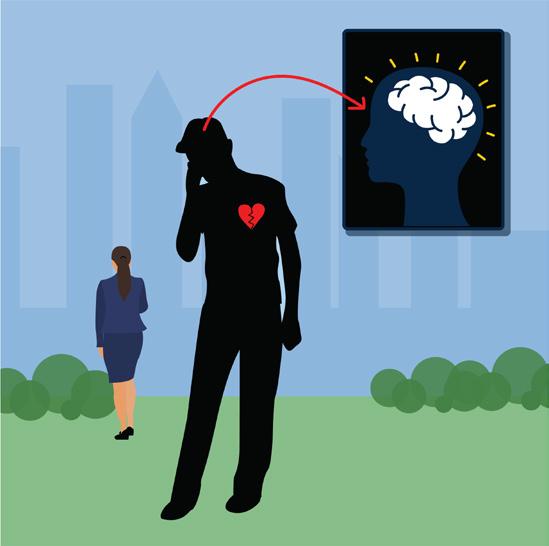 STEPHANIE CHAN/ AGGIE
STEPHANIE CHAN/ AGGIE
“A next step would be for us to address questions about what types of psychopathologies relate to these kinds of patterns in these kinds of conditions and situations,” Guyer said. “Does it carry over into specifically elevated depression symptoms or social anxiety symptoms? We could also look at not just pathologies, but also social competencies.”
UNPAIDINTERNSHIPS
FROM PAGE 4
This new program provides all UCDC students who secure an unpaid internship with a $1000 stipend in the form of a scholarship for the term of their internship. While this is still not much, it is a step in the right direction and many other universities should consider implementing similar programs. Recognizing the barriers to the professional world that unpaid internships create is the first step toward change.
If we want to foster diversity in leadership, change must start at the grassroots level with interns. Shifting to exclusively paid internship programs would attract a more diverse, qualified and expansive applicant pool, benefiting everyone and contributing to a more equitable future.
Disclaimer: The views and opinions expressed by individual columnists belong to the columnists alone and do not necessarily indicate the views and opinions held by The California Aggie.

